 15/10/2008 20:38 15/10/2008 20:38 |
|
| | | OFFLINE | | Post: 15.346 | Registrato il: 28/08/2005
| Utente Gold | |
|
 Earlier posts today in the preceding page:
Earlier posts today in the preceding page:
- Fr. Rosica's account of the Pope's intervention at the Synod yesterday. Posted by Benefan.
- The General Audience today. Photos and English synthesis of the Holy Father's catechesis on
St. Paul's ideas about the Church. A full translation of the catechesis has been posted in
AUDIENCE & ANGELUS TEXTS.
* * * * * * * * * * * * * * * * * * * * * * * * * * * * * * * * * * * * * * * * * * * * * * * * * * * * * * * * *
 New film on John Paul II will be
New film on John Paul II will be
shown tomorrow to Benedict XVI

VATICAN CITY, Oct. 15 (AFP) - Pope Benedict XVI on Thursday will be treated to an advance screening of a film about his predecessor John Paul II based on the memoirs of the Polish pope's personal secretary Stanislaw Dziwisz.
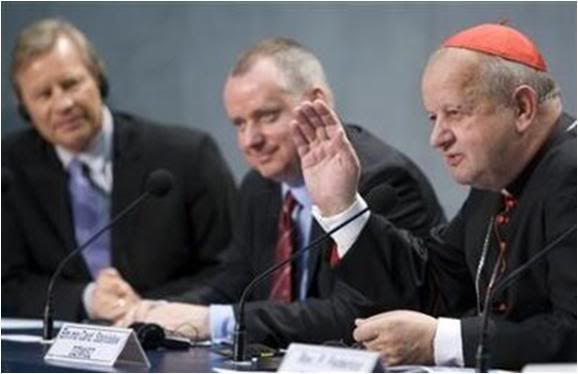
"Testimony" will ensure that "John Paul II is not forgotten," Dziwisz told a news conference on Wednesday, adding that the late Karol Wojtyla had been "like a father to me."
The film brings together documentary material and recreates scenes from John Paul II's private life as related by Cardinal Dziwisz, who was by Wojtyla's side for nearly 40 years, both before and after he was elected Pope in 1978.
The 2007 book by Cardinal Dziwisz, now the archbishop of Krakow, is titled "A Life with Karol" and has been translated into a dozen languages, with sales topping one million in Poland.
The film, co-produced by the Vatican, was directed by Polish filmmaker Pawel Pitera with British actor Michael York ("Cabaret," "Jesus of Nazareth") in the role of narrator.
It was shot on location at the Vatican and in Poland, notably in Krakow, where Wojtyla was archbishop, and in his hometown of Wadowice.
The 90-minute film marks the first time the Vatican has opened its doors to foreign cameras and to a Hollywood actor.
"Testimony" will be screened at the Vatican on Thursday to coincide with the 30th anniversary of John Paul II's election as Pope.
The film, which so far has English, Italian and Polish versions, will open in Poland on Thursday, with the schedule of releases elsewhere yet to be determined, a spokeswoman said.
[ A related story has been posted in the thread REMEMBERING JOHN PAUL II.]
[Modificato da TERESA BENEDETTA 15/10/2008 20:44] |
|
 15/10/2008 22:10 15/10/2008 22:10 |
|
| | | OFFLINE | | Post: 15.347 | Registrato il: 28/08/2005
| Utente Gold | |
|
 I've just discovered this blog on the US bishops' site - and it's a great idea. Cardinal Sean of Boston showed the way, but I realize not all bishops may be able to organize their time so as to do a weekly blog as he does. But for the USCCB to provide a site for bishops (and priests) is a good idea, though it shouldn't be limited to the Synod, or when there's a special event.
I've just discovered this blog on the US bishops' site - and it's a great idea. Cardinal Sean of Boston showed the way, but I realize not all bishops may be able to organize their time so as to do a weekly blog as he does. But for the USCCB to provide a site for bishops (and priests) is a good idea, though it shouldn't be limited to the Synod, or when there's a special event.
However, it is fitting that the first blog I've seen from Mons. Kicanas is on the Pope's intervention yesterday, and about the first time that the Bishops' Synod is addressed by women! Another historic 'first' under Benedict XVI, which might otherwise have gone unreported, other than by John Allen (Benefan posted his account of 'women's day at the Synod' in NEWS ABOUT THE CHURCH.
From the Synod - October 14, 2008
 
by Mons. GERALD KICANAS
Bishop of Tucson and Vice President, USCCB
Today’s session involved not only comments from Bishops but also interventions by the Pope himself, along with religious women and men, and laity who comprise the auditors invited to attend the Synod.
The Holy Father, a master teacher, focused his reflection on the historical-critical and theological-spiritual interpretation of the Scriptures. In a clear, concise, and lucid way, Benedict opened up this complex and critical point in dealing with the Word of God.
He emphasized that the historical-critical and theological-spiritual forms of exegesis are both necessary. Alone the historical-critical methodology is not sufficient, although important.
If one attends only to the historical-critical approach to the Bible, the Scriptures become a book of the past with nothing to say to the exigencies of the day. The Bible becomes pure history and nothing more.
Even more problematic, he said, exegetes only resorting to such an approach see everything in the Scriptures as reduced to human terms. One can deny the intervention of God in human history. Yet history also has a divine side.
He called the Synod Fathers and experts in Biblical exegesis to overcome the dualism possible between exegesis and theology. Clearly it is a point that concerns him deeply.
Benedict teaches masterfully and from the depths of his understanding of theology and God’s Word. As he sat at his place and expounded his text, I sensed a man who deeply loves the Scriptures, believes in the divine presence in the Word and is entirely convinced of the Word’s relevance for today. The Scriptures are God’s speaking to us here and now.
For the first time, the Synod Hall heard the voice of women, including one from the United States, invited to participate in the Synod.
Among the women who addressed the assembly were
- Maria Voce, President of the Focolare Movement;
- Michelle Moran, President of International Catholic Council of the Charismatic Renewal Services;
- Sister Evelyne Franc, Superior General of the Daughters of Charity of St. Vincent DePaul;
- Ewa Kusz, President of the World Conference of Secular Institutes; - Sister Jocelyn Huot, General President of the Les Brebise de Jesus Movement;
- Agnes Kam Leng Lam, President of the Catholic Biblical Association of Hong Kong;
- Teresa Maria Wilsnagh, Regional Director of the Bible Foundation of Cape Town;
- Sister Clara Millea, Superior General of the Apostles of the Sacred Heart of Jesus (USA),
- Sister M. Viviana Ballarin, O.P., Superior General of the Dominican Sisters of St. Catherine of Siena and President of the Superiors Major of Italy, and
- Natalja Fedorova Borovskaja, Professor at the State Humanistic University in Russia and at the Russian Academy of Fine Arts.
From this list you see the wide range of women who spoke, their diverse backgrounds and perspectives. Before the Synod some expressed concern whether the voice of women would be heard at the Synod.
The women who spoke today did so effectively, each adding their perspective and some offering suggestions for consideration by the Synod. Their contributions added some helpful directions as the Synod begins to look at forming propositions to be given to the Holy Father in preparation for his post-synodal exhortation.
Professor Fedorova, who teaches children about art and offers courses in art history, spoke of art and beauty as a way to encounter Christ. She described how so much of Scripture has been put to art reflecting especially on the painting by Rembrandt of the Prodigal Son, which is on display at the Hermitage in St. Petersburg, Russia.
It was this picture that Henri Nouwen used in writing about forgiveness, analyzing every facet of Rembrandt’s masterpiece to teach his theological, spiritual message. Art has a power few media can provide.
Agnes Kam Leng Lam, who works in Hong Kong, even suggested the Holy Father do a blog as a way of enticing the young to meet Christ. He smiled. I think it is a good idea. He has a way of inspiring young people.
One of the most striking moments of today was the comment made by Cardinal Emmanuel Delly of Iraq. His words moved us as he spoke of life in Iraq as tragic, a real Calvary. People lack basic elements of life. Schools are closed. Danger lurks everywhere. People fear for the future. He mentioned that 16 of his priests and two bishops have been kidnapped and some killed. Countless innocents have died. He asked, “Pray for us and with us.”
All in the hall applauded, a way of being in solidarity with him and his people who continue to suffer so much.
We also had an opportunity today to be led in the method of Lectio Divina, which received so much attention in the Instrumentum Laboris, and in the reflections of the Synod Fathers. Bishop Santiago Jaime Silva Retamales of Chile explained the steps reflecting on how effective the method has been in his own diocese.
The four steps involve reading a Scriptural text, meditating on it while focusing on some key words that draw the attention of the reader, praying and asking God the implications of this text for the person, ending in contemplation considering the conversion God is calling the prayer to realize in the person praying.
His intervention made more real this important way of entering into the Word of God.
We are nearing the end of the presentations. Most are looking forward to working in small groups to hone the reflections into concrete propositions that will assist the Holy Father in writing his document following the Synod.
 BTW, I'm rather disappointed - and quite surprised, frankly - that most of the reaction I've seen in the blogs so far to Agnes Kam's suggestion of a papal blog were 1) rather flippant, and 2) narrow-mindedly think of a blog simply as the news/gossip-cum-commentary that it generally is for most bloggers.
BTW, I'm rather disappointed - and quite surprised, frankly - that most of the reaction I've seen in the blogs so far to Agnes Kam's suggestion of a papal blog were 1) rather flippant, and 2) narrow-mindedly think of a blog simply as the news/gossip-cum-commentary that it generally is for most bloggers.
The papal blog Agnes Kam has in mind is, I believe, a specific, focused and brief message from the Holy Father on the Word of God as it applies to the daily life of Christians. He does that all the time in his various discourses, speeches and messages, but 1) they are necessarily not brief, and 2) the audience he reaches is rather narrow and limited, because most people - who do not work in the Church or with the Church, or have no particular reason to follow papal and Church news as we Benaddicts do - don't really get to see these texts, and what they might see in their local media about it is the usual bits of 'secular' interest that MSM cherry-pick for their readers.
Well, then, if they are to see 'bits' at all, then let them be Papal bits. As I commented yesterday, there are practical ways of immediately implementing a papal 'blog' - would it be called generically: a PLOG? (as in 'plogging/plugging for God') - that would not tie up the Holy Father at all in more 'labora' than he already has.
[Modificato da TERESA BENEDETTA 16/10/2008 07:15] |
 16/10/2008 06:27 16/10/2008 06:27 |
|
| | | OFFLINE | | Post: 15.354 | Registrato il: 28/08/2005
| Utente Gold | |
|

OR today.
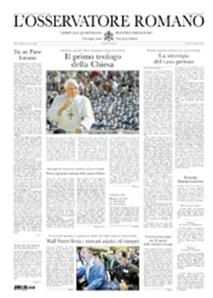 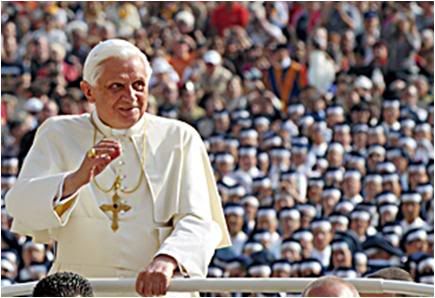
At the General Audience, Benedict XVI says all men are called on
to be the People of God and speaks of St. Paul as
'The first theologian of the Church'
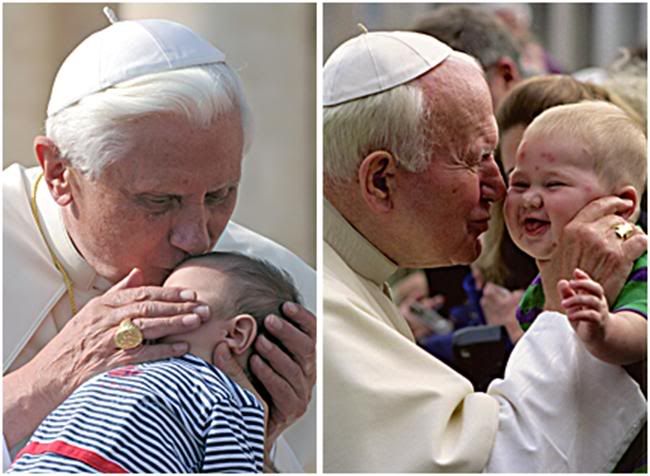 By coincidence or by choice, the OR has pictures of Benedict XVI and John Paul II kissing a baby - Benedict at yesterday's GA.
By coincidence or by choice, the OR has pictures of Benedict XVI and John Paul II kissing a baby - Benedict at yesterday's GA.
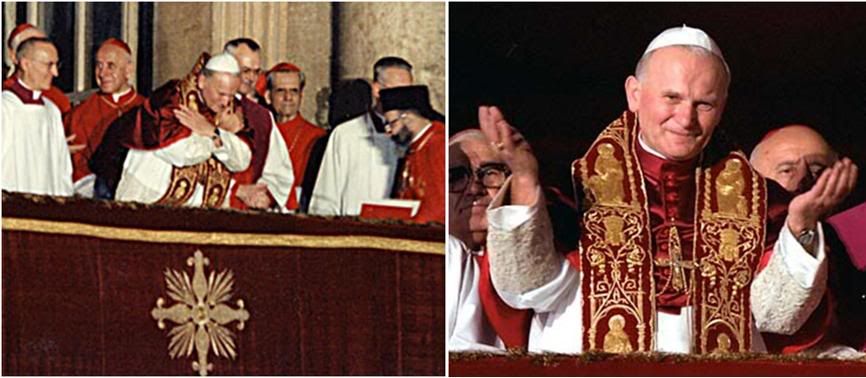
The Church today remembers John Paul II on the 30th anniversary of his election as Pope.
OR has the ff items about him:
- A front-page editorial
- An interview with Cardinal Dsiwisz recalling that evening of October 16, 1978
(translations of the editorial and the Dsiwisz interview have been posted in REMEMBERING JOHN PAUL II)
- an interview with Cardinal Deskur, JP-II's good friend
whom he visited in a Rome hospital two days after he became Pope;
- Cardinal Ruini's recollections of John Paul II's parish visits as Bishop of Rome (Preface to a book about
those diocesan activities)
- a tribute from a secular Jew, Arrigo Levi, who is a cionsultant to President Gorgio Napolitano
- and an interview with Gianfranco Svidercoschi, former deputy editor of OR,
who co-wrote Cardinal Dsiwisz's 'My Life with Karol' and
has insightful things to say about John Paul II and the media.
Also on Page 1: A commentary by Lucetta Scaraffia on a very actual issue of eugenics:
a baby boy was embryo-selected and conceived in Spain for the express purpose
of providing stem cells to cure an older brother of a genetic disease.
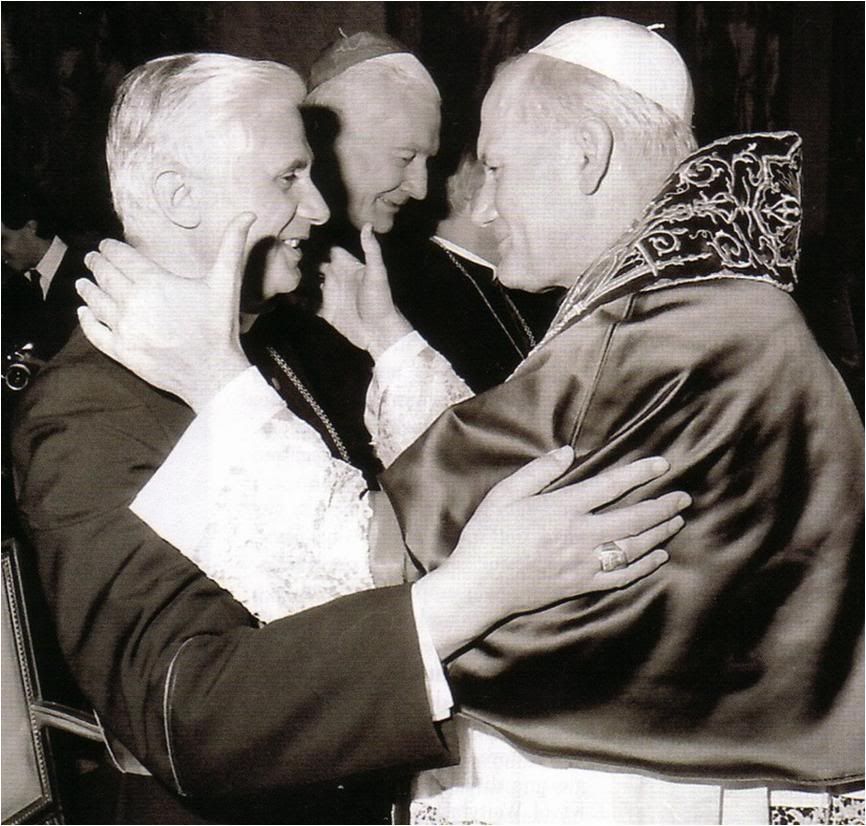 Thirty years ago today...
THE POPE'S DAY
Thirty years ago today...
THE POPE'S DAY
The Holy Father met today with
- Bishops of Ecuador (Group 2) on ad-limina visit. Address in Spanish.
- Participants in an international Congress promoted by the Pontifical Lateran University to mark
the 10th anniversary of John Paul II's encyclical Fides et ratio (Faith and reason). Address in Italian.
This afternoon, the Holy Father was scheduled to attend an advance screening of the film 'Testimony' based on
Cardinal Dsiwisz's memoir of John Paul II.
The Press office also released the text of the Pope's message to the United Nations Food and Agriculture
Organization (FAO) on the occasion of World Food Day today. Text in French.
It's the 10th working day of the Synod assembly.
(But since they have now broken up into working groups, I don't think the Pope will be taking part in this phase).
A news conference was held in the early afternoon to present the current Synod Assembly's
'Relatio post disceptationem' [Report after discussions] summarized in Latin to the assembly by
moderator Cardinal Marc Ouellet yesterday.
Participating were two of 3 delegate-presidents of the Assembly, Cardinal William Levada of the CDF,
and Cardinal Odilo Scherer of Sao Paulo; Cardinal Peter Turkson, Archbishop of Cape Coast (Ghana) and
president of the Association of Western African Bishops' Conferences, who is president of the Assembly's
information Committee; Mons. Luis Antonio G. Tagle, Bishop of Imus (the Philippines) and member of the
information committee; and Fr. Feederico Lombardi, Vaticna press director.
POPE TO BISHOPS OF ECUADOR:
'A mature laity can illuminate society'

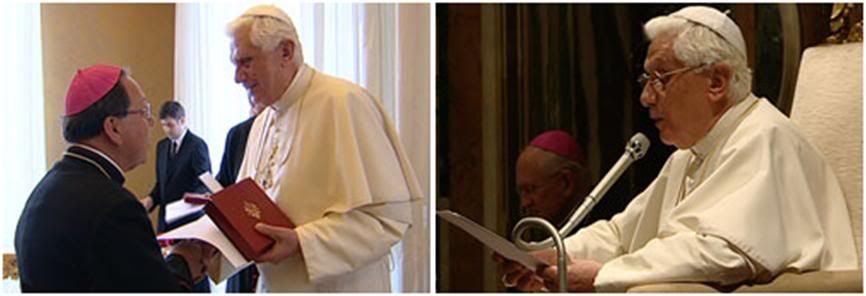
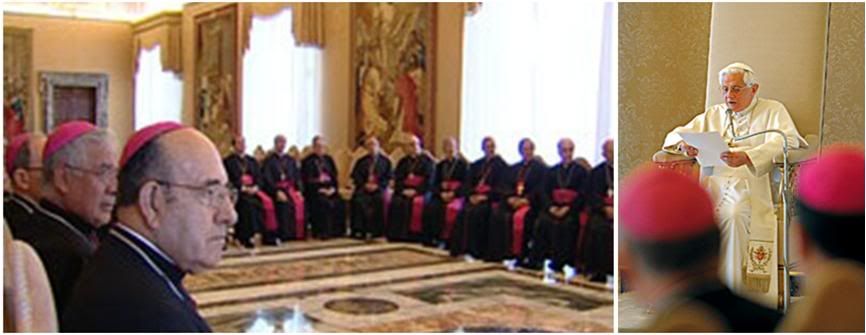
VATICAN CITY, 16 OCT 2008 (VIS) - Benedict XVI today addressed bishops from Ecuador, who are completing their "ad limina" visit.
He opened by reiterating his condolences for the recent death of Cardinal Antonio Jose Gonzalez Zumarraga, emeritus archbishop of Quito, the capital.
He then proceeded to his pastoral message.
"I note with satisfaction", the Holy Father went on, "that one of the pastoral initiatives you consider to be most important for the Church in Ecuador is implementing the 'great mission' identified by the Latin American Episcopate at Aparecida, Brazil. ... The call the Lord Jesus made to His disciples, sending them forth to preach the message of salvation and make disciples of all people, must be a constant theme of meditation and the raison d'etre of all pastoral activity for the entire ecclesial community".
"In order to face the many challenges of your mission, and in a cultural and social atmosphere that seems to forget the deepest spiritual roots of its identity ... it is necessary to make generous efforts to spread the world of God so that no-one remains without this indispensable spiritual nourishment, source of life and light".
The Pope recalled how this missionary task "depends particularly upon priests" and how, given the shortage of clergy in many areas of Ecuador, the prelates are "committed to involving all groups, movements and individuals" of their dioceses "in a wide-ranging and generous form of vocational pastoral care.
"These efforts", he continued, "must be accompanied by the greatest care in selecting seminarians and in their intellectual, human and spiritual formation. In this way ... they will be able to shoulder the demands of their future ministry with joy and a sense of responsibility".
"In this important stage of history, the Church in Ecuador needs mature and committed lay people who, with a solid doctrinal formation and a profound interior life, live their specific vocation of illuminating all human, social, cultural and political reality with the light of Christ".
Benedict XVI thanked the prelates for their efforts in "recalling the attention of society to those values whihc bring greater justice and solidarity to human life".
"Although the activity of the Church must not be confused with political concerns", he said, "it must, through reflection and moral judgements, offer its own contribution to the entire human community, also on those political questions that particularly affect human dignity".
The Holy Father concluded by calling on the bishops to dedicate particular attention to the charitable activities of their Churches, activities which must "express the merciful love of Christ, especially to people in need, the elderly, children, emigrants and to abandoned and mistreated women".
THE POPE'S MESSAGE FOR WORLD FOOD DAY
VATICAN CITY, 16 OCT 2008 (VIS) - Benedict XVI sent a Message to Jacques Diouf, director general of the United Nations Food and Agriculture Organization (FAO), on the occasion of World Food Day, an annual event organised by the FAO every 16 October.
The theme chosen this year - "World Food Security: the Challenges of Climate Change and Bioenergy" - "enables reflection upon achievements in the fight against hunger and upon the obstacles facing the FAO in the new challenges threatening the life of the human family"., wrote the Holy Father.
He underscored that "above all, we must undertake to illuminate the reasons that prevent authentic respect for human dignity. With the means and resources the world has at its disposal, it is possible to supply sufficient nourishment and to satisfy the growing needs of everyone".
"The incorrect management of food resources caused by corruption in public life and increasing investment in arms and sophisticated military technology, to the detriment of people's primary needs, has great importance", he added.
The Pope also pointed out that "an effective campaign against hunger, in order to confront climate change or to allocate agricultural production primarily to food, calls for much more than mere scientific studies. It is necessary, above all, to rediscover the significance of human beings in their individual and community dimensions".
"This reflects the need to build relations between peoples based on real and constant openness, to ensure that each country is able to satisfy the requirements of those in need, and to transmit the idea of relations founded on the interchange of reciprocal knowledge, values, rapid assistance and respect".
Benedict underscored the importance of "commitment to promoting effective social justice in relations among peoples", so that the economy may be oriented towards the distribution of the goods of the earth, "to their sustainable use and to the fair division of their benefits".
"One essential condition to increase levels of production and guarantee the identity of indigenous communities, as well as peace and security in the world", he concludes, "is to guarantee access to land, favouring agricultural workers and promoting their rights".
Pope says military spending
helps create food shortages

ROME, Oct. 16 (AP) -- The world has enough food to feed its growing population but many go hungry because of military spending, corruption and speculation, Pope Benedict XVI said Thursday.
Rich countries continue a "race for consumption" even as food becomes more scarce in poorer regions, the pope said in a message to the U.N.'s Food and Agriculture Organization on World Food Day.
"The means and resources that the world has today are able to provide enough food to satisfy the growing needs of everybody," Benedict told the Rome-based agency.
Benedict blamed food shortages on "feverish speculation" that drives up prices, along with "corruption in public life or growing investments in weapons and sophisticated military technologies to the detriment of people's primary needs."
The Pope's message was read at a ceremony held at FAO's headquarters, where leaders and experts renewed calls for an international commitment to fight world hunger.
Opening the ceremony, FAO's Director-General Jacques Diouf said only 10 percent of $22 billion (16 billion euros) that was pledged by nations this year to fight food shortages has so far materialized, mainly for emergency aid.
FAO said number of hungry people increased by 75 million in 2007 to reach a total of 923 million. Diouf says another 25 million people are expected to be forced into hunger this year.
 I couldn't access Avvenire's page-by-page display earlier, but here is their coverage of the main Church-related news today:
Remembering John Paul II
I couldn't access Avvenire's page-by-page display earlier, but here is their coverage of the main Church-related news today:
Remembering John Paul II
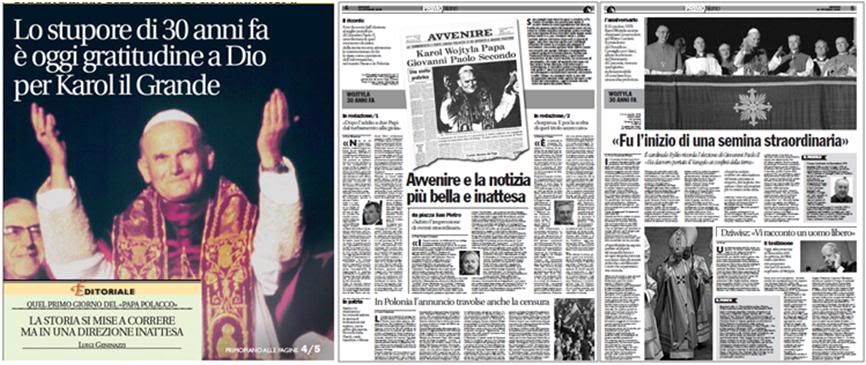 Front page-picture and editorial, and a two-page spread recalling the euphoria of Oct. 16, 1978, plus interviews with Cardinals Dsiwisz and Rylko. The front-page headline reads: 'The wonder 30 years ago, and today, great gratitude to God for Karol the Great'..
Front page-picture and editorial, and a two-page spread recalling the euphoria of Oct. 16, 1978, plus interviews with Cardinals Dsiwisz and Rylko. The front-page headline reads: 'The wonder 30 years ago, and today, great gratitude to God for Karol the Great'..
The General Audience of Wednesday
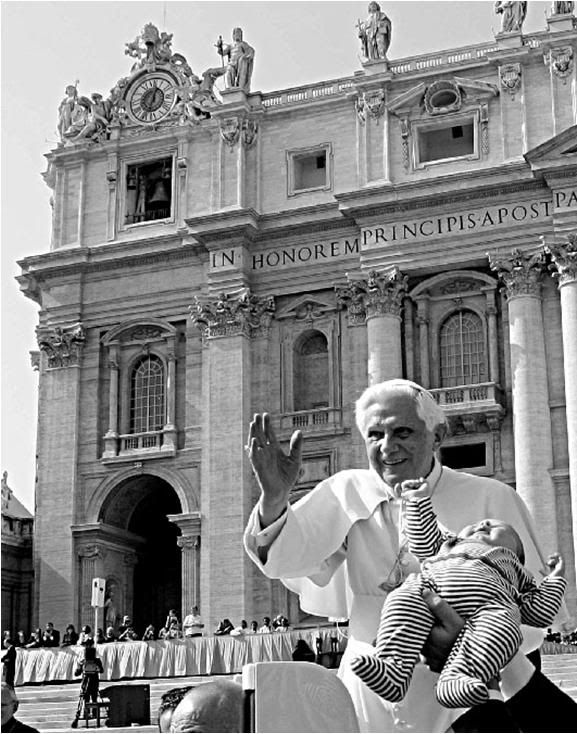 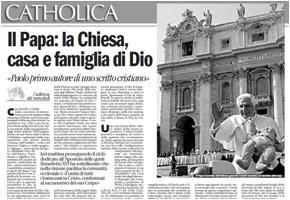 The report includes the entire text of the Pope's catechesis.
The Bishops' Synod and 'Fides et Ratio'.
The report includes the entire text of the Pope's catechesis.
The Bishops' Synod and 'Fides et Ratio'.
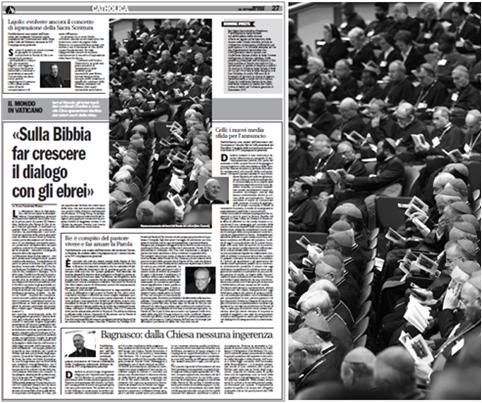 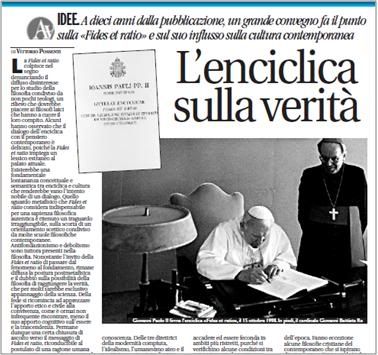 A full page on Synod reports, and a special report on Fides et ratio, John Paul II's landmark encyclical.
A full page on Synod reports, and a special report on Fides et ratio, John Paul II's landmark encyclical.
[Modificato da TERESA BENEDETTA 19/10/2008 03:24] |
 16/10/2008 18:33 16/10/2008 18:33 |
|
| | | OFFLINE | | Post: 15.360 | Registrato il: 28/08/2005
| Utente Gold | |
|
 On the 10th anniversary
On the 10th anniversary
of 'Fides et ratio' encyclical:
Benedict XVI says Revelation
'purifies and exalts' reason
 A full translation of the Holy Father's address has been posted in
A full translation of the Holy Father's address has been posted in HOMILIES, DICOURSES, MESSAGES.
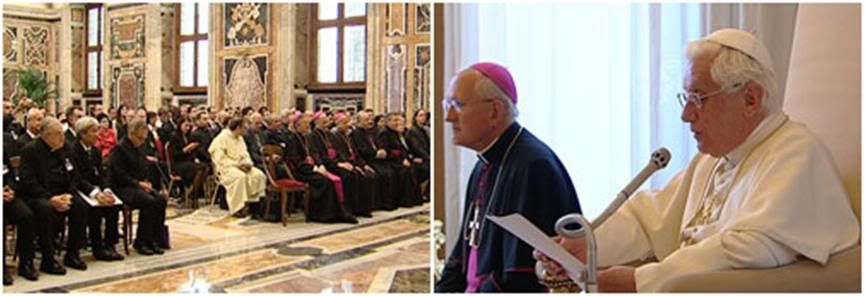
Vatican City, Oct 16, 2008 (CNA).- Pope Benedict XVI on Thursday declared Pope John Paul II’s encyclical Fides et Ratio to be of “constant relevance” during an address to participants in a conference marking the tenth anniversary of the encyclical’s promulgation.
The encyclical, Pope Benedict said, is characterized by its “great openness to reason” at a time when some speculate about reason’s weakness.
“The truth of Revelation is not superimposed on the truth achieved by reason,” Pope Benedict explained. “Rather, it purifies and exalts reason.”
The conference marking the encyclical’s anniversary was organized by the Pontifical Lateran University in collaboration with the Pontifical Academy of Sciences and the World Conference of Catholic University Institutions of Philosophy, the Vatican Information Service reports. Participants in the congress were received by Pope Benedict in a Thursday morning audience.
Speaking to them, the Pope described how John Paul II’s encyclical “underlined the importance of uniting faith and reason in a reciprocal relationship” while respecting the autonomy of each.
The encyclical addressed an “emerging need” of modern societies by defending “the force of reason and its capacity to arrive at truth” while presenting the faith as a “specific form of knowledge” which opens us to the truth of Revelation.
“The encyclical says that we must trust in the capacity of human reason and not set overly modest goals,” Pope Benedict explained.
"Who can deny the contribution the great philosophical systems have made to the development of man's self-knowledge and to the progress of various cultures?” the Pope asked, continuing: “Indeed, these cultures become fruitful when they open to truth, enabling those who participate in them to reach objectives that make social life ever more human."
Pope Benedict said there has been a shift “from a prevalently speculative form of thought to a chiefly empirical one.”
“Research has turned to focus above all on the observation of nature in the attempt to discover its secrets. And the desire to understand nature has then been transformed into the desire to reproduce it,” he explained.
“Scientific and technological progress, which 'fides' (faith) is increasingly called to confront, has altered the old concept of 'ratio' (reason); in some way it has marginalized the reason that sought the ultimate truth of things to make way for a reason that satisfies itself with discovering the contingent truths of the laws of nature.”
The Pope affirmed that scientific research “certainly has a positive value” when the applied sciences “are the fruit of reason and an expression of the intelligence with which man manages to penetrate the depths of creation.”
He emphasized that faith does not fear scientific progress and its developments “when their ultimate focus is man, his wellbeing and the progress of all humanity.”
However, he noted, “science is not capable of establishing ethical principles.” Here, theology and philosophy are an “indispensable aid.”
“This does not mean limiting scientific research ... but keeping alive the sense of responsibility which reason and faith must have towards science, to ensure it remains at the service of man,” the Pope said.
“Reason,” he continued, "discovers that beyond its own achievements and conquests there exists a truth that can never be discovered by using its own parameters, but only received as a gratuitous gift. The truth of Revelation is not superimposed on the truth achieved by reason. Rather, it purifies and exalts reason, enabling it to expand beyond its confines to become part of a field of research as unfathomable as the mystery itself."
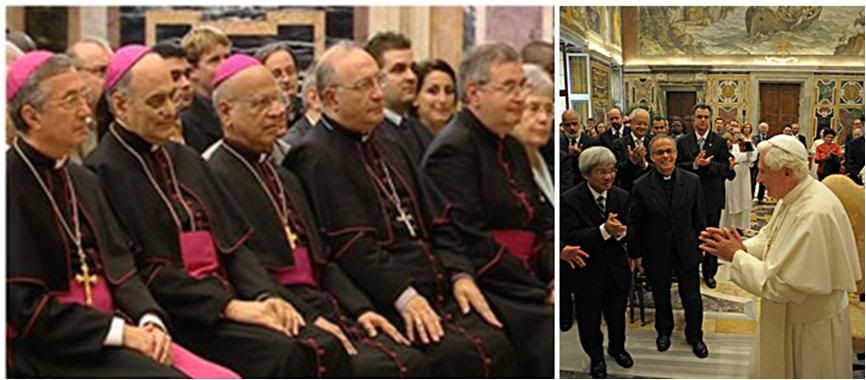
Pope Benedict concluded his audience by saying that the “passion for truth” impels us to examine ourselves to discover “the profound meaning of our lives in the interior man.”
“True philosophy must lead people by the hand and bring them to discover how fundamental knowing the truth of Revelation is for their own dignity.”
 The theme of 'faith and reason' also came up during the news conference today in which Synod assembly officials presented a report on the 230 interventions that had been given in the first 9 days of the current General Assembly.
Benedict VXI shows
The theme of 'faith and reason' also came up during the news conference today in which Synod assembly officials presented a report on the 230 interventions that had been given in the first 9 days of the current General Assembly.
Benedict VXI shows
'right balance' between
faith and reason,
Cardinal Levada says
Translated from

Oct. 16, 2008
"An example of the modern tension between faith and reason".
Cardinal William Levada, prefect of the Congregation for the Doctrine of the Faith, gave that answer when a journalist asked him today to comment on the different accent that Pope Benedict XVI has ed on the historico-critical method of Biblical interpretation
The newsman pointed out that in the Pope's lecture at the College des Bernardins in Paris, he said it was an antidote to Catholic fundamentalism, and in his intervention at the current Bishops' Synod assembly on Monday, he warned of the risks inherent in the method.
Levada was one of the Synod officials who briefedd the media today on the Synod's 'Relatio post disceptationem [Report after discussions], which had been summarized in Latin to the assembly yesterday by
moderator Cardinal Marc Ouellet.
Besides Levada, who is one of three delegate-presidents of this Assembly,the other officials were Cardinal Odilo Scherer of Sao Paulo, also a delegate-president; Cardinal Peter Turkson, Archbishop of Cape Coast (Ghana) and president of the Association of Western African Bishops' Conferences, who is president of the Assembly's
information Committee; Mons. Luis Antonio G. Tagle, Bishop of Imus (the Philippines) and member of the information committee; and Fr. Feederico Lombardi, Vatican press director.
Levada pointed out that "the fundamentalist approach to Biblical interpretation was all faith, whereas the use of the historico-critical method is all reason. Pope Benedict XVI advocates the right balance between faith and reason."
"The fact that Jesus was incarnated is always central to the interpretation of Scriptures," he said, "and it involves historical and human factors. But a right interpretation of the Scriptures as the Word of God revealed to us cannot be limited to the horizons of the human being" but must be considered "in the perspective of a new creation, in which Jesus is the first born".
Therefore, he said, as Pope Benedict underscores, it is important to "look at both the factors for human understanding, which are rational, and an intelligence of faith which is in Revelation itself and which calls us to respond with our faith."
Meanwhile, to another question about the Pope's intervention on Monday, Fr. Lombardi explained that "We are waiting for a final clean text from the Pope". [The Pope had spoken to the Assembly without a prepared text, speaking from talking points he had apparently written on a notebook.]
A newsman noted some differences in what L'Osservatore Romano reported about the Pope's words and some news agency reports.
Cardinal Scherer commented: "The Pope's intervention also referred specifically to an issue that had been raised quite often on the floor. Namely, that scholarly exegesis is not enough if one does not place oneself in a position to really 'listen' to the Word of God."
This means, he said, that Scripture must be "interpreted in the sense of the faith of the Church, therefore, from the viewpoint of a listener who listens with the ears of faith, in an attitude that becomes that of discipleship."
[Modificato da TERESA BENEDETTA 19/10/2008 00:30] |
 16/10/2008 21:18 16/10/2008 21:18 |
|
| | | OFFLINE | | Post: 15.362 | Registrato il: 28/08/2005
| Utente Gold | |
|
 REMEMBERING JOHN PAUL II:
REMEMBERING JOHN PAUL II:
Pope Benedict sees new film
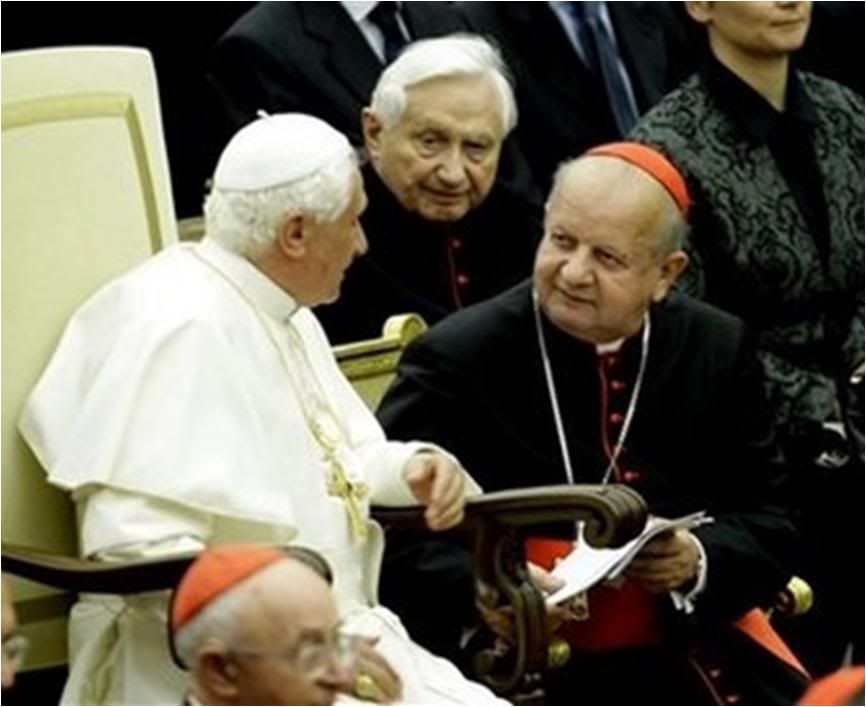 Cardinal Dsiwisz has the seat of honor on the Pope's left; and Mons. Georg Ratzinger also next to his brother.
Cardinal Dsiwisz has the seat of honor on the Pope's left; and Mons. Georg Ratzinger also next to his brother.
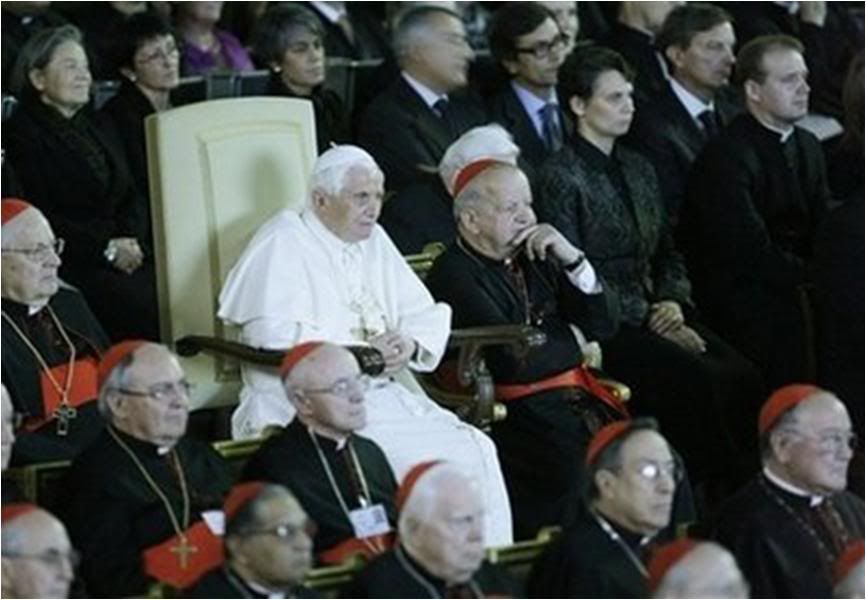
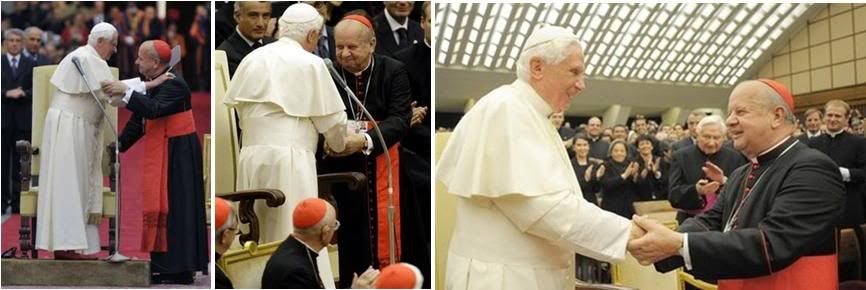
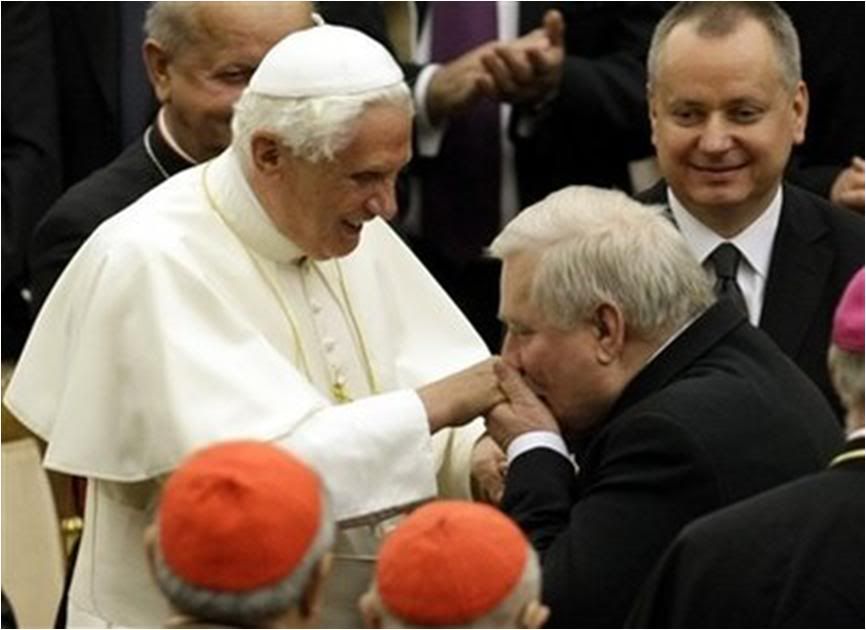 Above, former Polish President and Solidarity leader Lech Walesa greets the Pope.
A Pontificate that marked
Above, former Polish President and Solidarity leader Lech Walesa greets the Pope.
A Pontificate that marked
the Church and the world

VATICAN CITY, Oct. 16 (Translated from Apcom) - John Paul II "marked the history of the Church and of the world in the last part of the 20th century and the beginning of the third millennium", Benedict XVI said this afternoon after watching with the Synod fathers, the world premiere presentation of the film Testimony, based on Cardinal Stanislaw Dsiwisz's memoir, 'A Life with Karol'.
"The film shows the simple humanity, the decisive courage and finally, the suffering, of Papa Wojtyla, who to the end, had the conditioning of a mountaineer and the patience of a humble servant of the Gospel".
He recalled "that evening of October 16, 1978, thirty years ago, which has remained impressed in the hearts of everyone", when the new Pope, until then Cardinal Wojtyla, presented himself to the crowd with a now-historic phrase, "If I am wrong, you will correct me" [referring to his Italian].
"John Paul II's Pontificate", said his successor, "is bracketed and enclosed in two expressions. The first - 'Open your doors wide to Christ! Do not be afraid!', was a vibrant jolt to public opinion and would echo in his lips many times through the succeeding years. The second - 'Let me go to the Lord' - is what he said faintly on his deathbed at the end of a long and fruitful earthly pilgrimage."
NB: In the second photo, the Memores are once again seen seated right behind the Holy Father.
It says a lot about him that, at least in this respect, he gives his household staff no less importance than prelates.
About the film:
Testimony tells the true story by JP II's long-time secretary, friend and closest witness to the most important events of his pontificate in documentary form, plus dramatic re-enactments of some of the most important events of his papacy.
The movie reveals details not told in the original memoir, including memories of Karol Wojtyła's childhood and youth. It also depicts previously unknown and poignant moments from the Pope's private life.
The film uses documentary materials and dramatized reconstructions of events to tell its story, including an in-depth interview with Cardinal Dziwisz himself. The whole film is tied together with a narration by British actor Michael York.
Directed by Pawel Pitera and produced by Przemysław Häuser, with an original score composed by Vangelis and Polish popular musician Robert Janson, Testimony will be released in Poland on October 17.
Here's a belated account of the film showing from CNS:
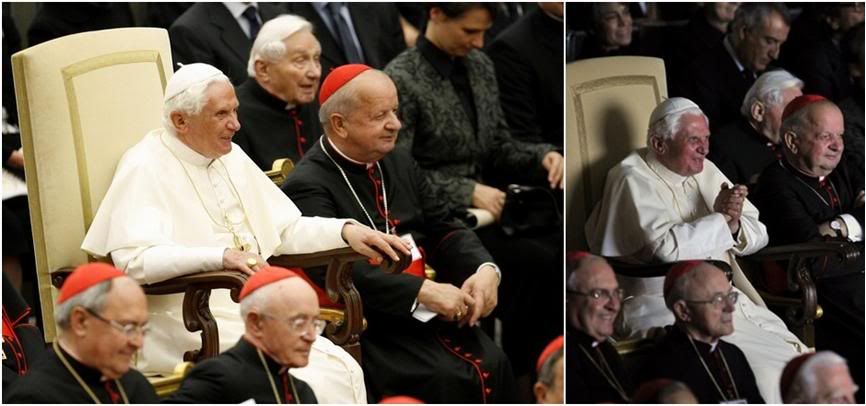
 Poignant moments, some surprises
Poignant moments, some surprises
in new film about late Pope
By John Thavis

VATICAN CITY, Oct. 17 (CNS) -- Pope John Paul II was lightly wounded by a knife-wielding priest in Portugal in 1982, one year after a gunman tried to kill him in St. Peter's Square, according to one of the late pope's closest aides.
The disclosure came in a biographical film screened for the first time at the Vatican on Oct. 16, the 30th anniversary of Pope John Paul II's election. Pope Benedict XVI and many of the world's bishops were in attendance.
Titled "Testimony," the film is based on a book of memoirs by Cardinal Stanislaw Dziwisz of Krakow, Poland, who was the late pope's personal secretary for 39 years, until the pope's death in 2005.
In the film, Cardinal Dziwisz recalled that the pope went to the Marian sanctuary of Fatima, Portugal, in 1982 to thank Mary for saving his life in the 1981 shooting. During an evening ceremony, a priest carrying a large knife lunged toward the pontiff.
At the time, Vatican officials said the pope was unharmed and was only informed about the incident the next day.
In the film, Cardinal Dziwisz said the pope was in fact able to carry on with the prayer service and the rest of his schedule in Fatima.
"It was only when we returned to his room that I saw blood on his vestments," the cardinal added. He did not elaborate, but other Vatican sources said the pope may have been superficially wounded in the attack.
The 90-minute film, narrated in English by the actor Michael York but dubbed in Italian for the Vatican screening, used actors to depict scenes from the pope's life along with historical video footage and still photographs.
Cardinal Dziwisz recounted how he and aides would spirit the pope out of the Vatican on secret outings to the mountains near Rome, sometimes hiding the pontiff behind an opened newspaper in the back of a car.
In one of the most dramatic re-enactments in the film, the pope performs an exorcism on a woman brought to him thrashing and screaming. Cardinal Dziwisz said the woman was possessed, and only when the pope told her he would celebrate a Mass for her did she suddenly become calm.
Some of the film's most poignant moments came when Cardinal Dziwisz revealed simple facts about the pope's day-to-day life in the Vatican: how each morning he read the prayer intentions that had been sent to him and placed on his kneeler, then spent a long time praying for them; how he was upset by the fact that homeless people were sleeping on the Vatican's doorstep, and so asked Blessed Mother Teresa to open a charity shelter inside the Vatican; and how he brought Polish traditions to the Vatican, especially at Christmas.
The pope would sing aloud at least one Christmas song a day for several weeks, beginning Christmas Eve, he said.
The film drew the biggest round of applause when it showed then-Cardinal Joseph Ratzinger -- now Pope Benedict -- embracing the pope many years ago.
At the end of the screening, Pope Benedict addressed the several thousand people in the Vatican's audience hall and told them the film had allowed them all to relive the moving story of Pope John Paul, who "from heaven is certainly with us."
"The film reveals Pope John Paul's human simplicity, his resolute courage and finally his suffering, faced right up to the end with the strength of a mountaineer and the patience of a humble servant of the Gospel," he said.
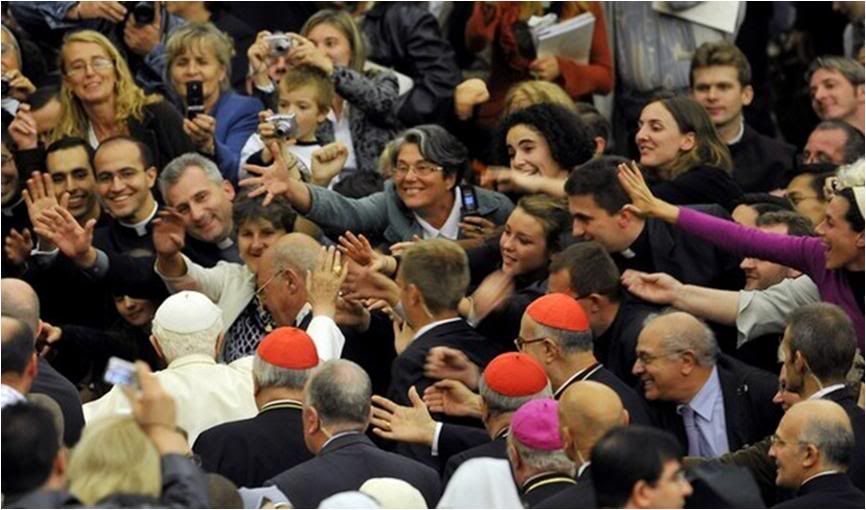
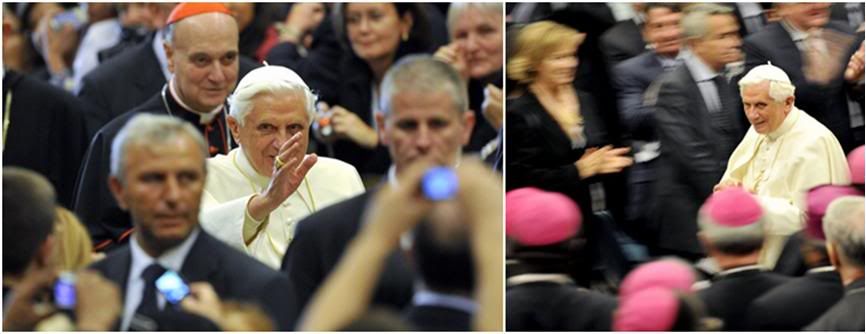
[Modificato da TERESA BENEDETTA 18/10/2008 23:48] |
 16/10/2008 22:19 16/10/2008 22:19 |
|
| | | OFFLINE | Post: 3.360 | Registrato il: 23/11/2005
| Utente Master | |
|
NB: In the first photo, the Memores are once again seated right behind the Holy Father.
It says a lot about him that, at least in this respect, he gives his household staff no less importance than prelates. Teresa
Isn't that Brother George sitting next to Cardinal Dziwicz? It looks like his white hair behind the cardinal and that is the Memores sister next to him that usually helps him when he is in Rome. I am surprised that he is in Rome at this time. Has anyone heard about how long he will be there?
*******************
Yes, it is him all right. Yahoo eventually posted a photo showing him in full, as you can see. Lella first reported seeing him in the TV coverage of the Bruckner concert earlier this week. It is rather unusual for him to be back in Rome so soon after the many summer weeks he spent in Bressanone and Castel Gandolfo. Perhaps his brother has been able to persuade him to spend more time in Rome.... Between them, the Ratzinger brothers have enough hair for all the bald/balding bishops in the picture!
TERESA
[Modificato da TERESA BENEDETTA 17/10/2008 02:04] |
 17/10/2008 12:26 17/10/2008 12:26 |
|
| | | OFFLINE | | Post: 15.370 | Registrato il: 28/08/2005
| Utente Gold | |
|

OR today.
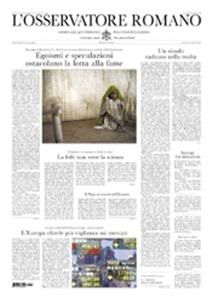
Benedict XVI's message to FAO on World Food Day:
'Selfishness and speculation hinder the struggle against hunger'
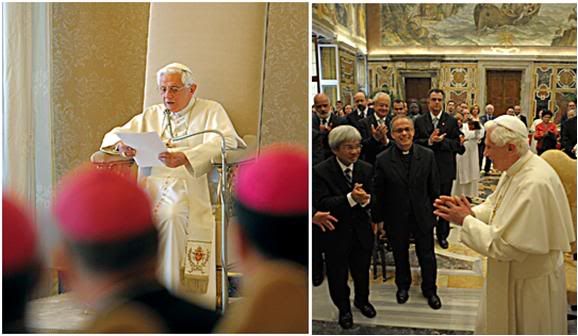 Other stories on page 1: In his address to mark the 10th anniversary of 'Fides et ratio', the Holy Father
Other stories on page 1: In his address to mark the 10th anniversary of 'Fides et ratio', the Holy Father
says 'faith does not fear science'; the Pope's message to the bishops of Ecuador; an editorial on
the current Synod assembly which is 'rooted in reality'; and a continuing market watch. (Papal
photos in the inside pages show him addressing the bishops of Ecuador and interacting with participants
of the 'Fides et ratio' congress.)
No papal schedule posted so far.
It's the 11th working day of the Synod assembly.
|
 17/10/2008 13:18 17/10/2008 13:18 |
|
| | | OFFLINE | | Post: 15.371 | Registrato il: 28/08/2005
| Utente Gold | |
|
 The Synod calls for better homilies:
The Synod calls for better homilies:
The Pope is the model
The Synod fathers are proposing a 'manual' to elevate the quality of preaching.
But the living example is Benedict XVI - and the unscripted meditation
with which he opened the working sessions, while stock markets were collapsing around the world.

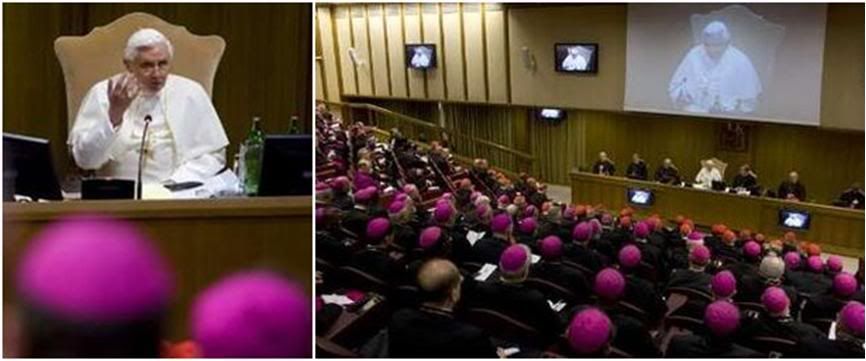
ROMA, October 17, 2008 – In nine days of general discussions in the assembly hall, the synod of bishops on "The Word of God in the life and mission of the Church" has concentrated much of its attention on the homily.
In kicking off the discussion – which then continued in the various language groups – Cardinal moderator Marc Ouellet noted that, in effect, the Sunday homily is for most Catholics all over the world the only moment in which they listen to and reflect upon the Sacred Scriptures, which are proclaimed just before this during the Mass.
This is why it is so crucially important. And this is why it is so urgent, as emphasized by many of the speakers, to elevate the quality of the homily with respect to the current average standards, which are notoriously inadequate.
Ouellet received and reiterated the proposal – made by various synod fathers – for a "manual" that would help bishops, priests, and deacons to prepare as well as possible their homilies for the Mass.
The bishop of Tucson, Gerald Kicanas, vice president of the United States conference of Catholic bishops, had even suggested following the current Pauline Year, in 2009, with a Year of Preaching.
Ouellet also called attention to the amplification of hearing and seeing the Sacred Scriptures provided by music and by the figurative arts, an amplification that is still alive in the Eastern rite Churches, in comparison with the musical and iconic impoverishment that impairs the Latin rite Churches today.
Neither the speeches in the assembly hall nor the final relation made any reference to concrete models for the homily, to be taken as a good example.
But an exemplary homilist was already in their midst, in person: Pope Benedict XVI.
Joseph Ratzinger's liturgical preaching is one of the outstanding features of his pontificate. It is one of the less examined and less well-known features, but it is perhaps the most fascinating. It is the most authentic expression of his thought. He writes most of his homilies himself, and sometimes improvises them.
Even those brief comments on the biblical readings for the Mass of the day that he makes almost every Sunday before the Angelus are homiletic jewels.
In the Americas, some priests have taken notice of this, and take them as an outline for their homilies that same Sunday. When the Pope recites the Angelus in Rome at midday, it is still early morning in the Americas: 5:30 in Mexico City, 6:30 in Miami, Lima and Bogotà, 7:00 in Caracas, 7:30 in Buenos Aires and Santiago, Chile, 8:30 in Rio de Janeiro.
[I hope the tendency is widespread! The problem, of course, is that translations are not immediately available, so unless the priest knows Italian, then immediate access to the Vatican bulletin on the Angelus message, catechesis or homily, is not going to help to get the homily message that applies for the day. But one of the bees in my bonnet the past three years, that I have buzzed about now and again, is the wish that priests all over the world can be 'wired' directly - i.e., have Internet access - to the Vatican for this very purpose, which should also be the Vatican's primary incentive to provide prompt translations of the Pope's texts!]
American Catholic news agencies like AciPrensa and CNA translate the Angelus address by Benedict XVI and release it immediately in Spanish, Portuguese and English. With a spike in webpage visits. [CNA is the English service of Aciprensa, which is the parent agency, but I did not know they translate the Pope's texts into English! Because they'd be quoted by the blogs right and left if they actually did. What they do - in English, at least - is to translate excerpts of a text for purposes of news reporting, much as AsiaNews does.]
This is another way in which Pope Ratzinger teaches. And he will do so even more when, in three weeks, Scheiwiller publisher will print a book in Italy – the first of its kind – assembling all of the homilies by Benedict XVI over the last liturgical year.
But returning to the synod, there is one homily above all that especially impressed the fathers. It is the one that Benedict XVI gave in the synod hall on the morning of October 6, the first day of its work, during the recitation of the third hour of the Divine Office.
Benedict XVI improvised it from start to finish. The media all over the world quoted only the passage in which the Pope referred to the "collapse of the big banks." But it is a homily that should be read and savored as a whole.
He proceeds to provide the text of the meditation, previously translated on this thread and available now in the Vatican translation on
www.vatican.va/holy_father/benedict_xvi/speeches/2008/october/documents/hf_ben-xvi_spe_20081006_sinodo...
[Modificato da TERESA BENEDETTA 17/10/2008 13:42] |
 17/10/2008 16:22 17/10/2008 16:22 |
|
| | | OFFLINE | | Post: 15.373 | Registrato il: 28/08/2005
| Utente Gold | |
|
 Italian MSM today predictably focused on statements made by the Holy Father yesterday about the role of science, with some far-left scientists making offensive remarks even. Since I posted news reports yesterday about the Holy Father's discourse on the 10th anniversary of John Paul II's encyclical Fides et ratio - and more importantly, a full translation of that discourse in HOMILIES, DISCOURSES, MESSAGES - I have chosen to translate for today a related story that I have only seen in Avvenire, which, like L'Osservatore Romano, always posts the full texts of papal discourses.
Italian MSM today predictably focused on statements made by the Holy Father yesterday about the role of science, with some far-left scientists making offensive remarks even. Since I posted news reports yesterday about the Holy Father's discourse on the 10th anniversary of John Paul II's encyclical Fides et ratio - and more importantly, a full translation of that discourse in HOMILIES, DISCOURSES, MESSAGES - I have chosen to translate for today a related story that I have only seen in Avvenire, which, like L'Osservatore Romano, always posts the full texts of papal discourses.
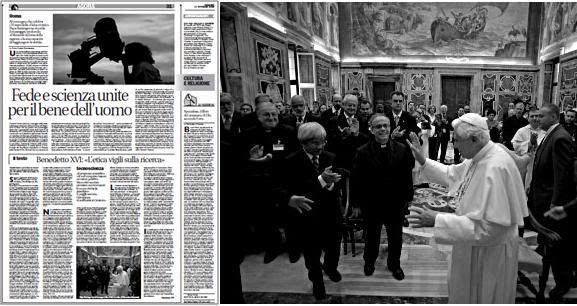 Faith and science united
Faith and science united
for man's good
by GIANNI SANTAMARIA
Translated from

October 17, 2008
A 'marvelous architectonic construction' and a 'marvelous mural fresco', which places before our eyes 'the fundamental stages of the encounter between faith and reason'.
From St. Paul, to the Fathers of the Church and Thomas Aquinas, up to 'modern times' in which "a pernicious separation (between faith and reason) appears to dominate large strata of thinking", Cardinal Tarcisio Bertone used artistic metaphors to describe the relevance of Fides et ratio, John Paul II's encyclical which came out ten years ago.
The encyclical is the focus of a three-day international conference at the Pontifical Lateran University which opened yesterday, with the collaboration of the Pontifical Academy of Sciences and the World Conference of Catholic University Philosophical Faculties.
Cardinal Bertone addressed the conference yesterday afternoon after the participants had an audience with Benedict XVI at the Vatican.
He underlined the continuity between the encyclical and the thinking of the present Pope, as expressed in the Regensburg lecture, the undelivered speech for La Sapienza University and his recent lecture at the College des Bernardins in Paris [and reiterated in the Pope's discourse yesterday which is reproduced on this page].
He also related the anniversary to other current celebrations - the thirtieth anniversary of John Paul II's election as Pope, and the current assembly of the Bishops' Synod.
Bertone did not fail to underscore the contribution made by then Cardinal Ratzinger to the draft of the encyclical, speaking from his own knowledge as Secretary of the Congregation for the Doctrine of the Faith at the time.
Thus, he was able to trace the 'pre-history' of the encyclical with firsthand recollections. The first 10-page outline for such a document was ready as early as 1986, he says, and it took more than ten years, from one draft to another, before it became the magisterial document that we know.
The successive versions were sent to various bishops and professors, both Catholics and secular, for review and comments. And when the Pope wanted input - in the name of the famous 'two lungs' of the Church - from thinkers of the Greek Orthodox tradition, he sought the guidance of the Czech Jesuit (who would become a cardinal) Thomas Spidlik to ascertain the rightness of his choices.
Turning to the reception and continued relevance of the encyclical, Bertone said the first reactions were mainly positive, although it did not lack for criticism from respectful seculars (like Massimo Cacciari, the philosopher who became mayor of Venice) as well as some Catholic intellectuals.
But, compared to ten years ago, he points out, "dangerous relativistic trends continue to grow which Pope Benedict has not ceased to denounce".
He had two suggestions for continuing effort to disseminate the teaching of the encyclical. One concerns fundamental concepts that are indispensable for philosophy itself - such as a personal God, sin and guilt, equality and freedom.
The other is the 'circularity between faith and philosophy'. Echoing what the Pope said earlier in the day, he said that the search for truth hinges on listening to the Word of God which encounters reason and purifies it.
"If philosophy is interested in empirical discoveries," Bertone asked, "why should it ignore religious traditions, and especially, the message of the Bible, as a source of knowledge?"
In his remarks to the Pope at the earlier audience in the Vatican, Mons. Rino Fisichella, rector of the Lateran University, said that Fides et ratio stimulates a recovery of "the courage to keep one's attention on the ultimate truth with the desire of reaching it". {Recall John Allen's quip that at the time, Vatican wags referred to the encyclical as 'Fisichella et Ratzinger' because as a consultant to the CDF, Fisichella is widely believed to have been a major 'drafter' of the final document along with Cardinal Ratzinger.]
Philosopher Vittorio Possenti, one of the conference speakers, called it 'an epochal text', citing the absolute novelty of its definition of nihilism, as anti-realism and obliviousness to being and truth.
"But the stimulus has not been taken up" adequately and we are still stuck at 'current diagnoses', he lamented.
French Archbishop Jean-Marie Brugues, secretary of the Congregation for Catholic education, said that the encyclical Spe salvi must be added to the Ratzinger texts on faith and reason cited by Cardinal Bertone.
In fact, the concluding round-table discussion on the first day of the conference - with Professors Francis Jacques (France), Lluis Clavell (Spain) and Norbert Fischer (Germany) - agreed that lack of hope had "become the blind spot of human society".
[Modificato da TERESA BENEDETTA 17/10/2008 16:42] |
 17/10/2008 17:10 17/10/2008 17:10 |
|
| | | OFFLINE | | Post: 15.374 | Registrato il: 28/08/2005
| Utente Gold | |
|

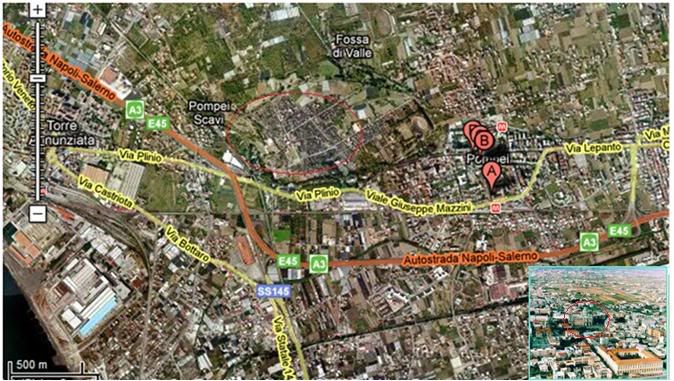 Naples is to the northwest; the ruins of ancient Pompeii (Pompeii Scavi) are encircled; the modern town is lower right
Naples is to the northwest; the ruins of ancient Pompeii (Pompeii Scavi) are encircled; the modern town is lower right
(and inset); A and B mark the locations of the Pontifical Delegation residence and the Shrine, respectively.
Pompeii awaits the Pope
Translated from

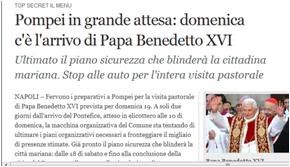
October 17, 2008
NAPLES - Preparations in Pompeii are at fever pitch for the pastoral visit of Pope Benedict XVI on Sunday.
With two days left before the big event, the organizational machine of the city has finalized plans to deal with the tens of thousands of visitors expected.
Security measures will virtually put the Marian city under hermetic protection from 6 p.m. Saturday evening until after the Pope has left to return to Rome. Within the customary red zone of security, no traffic or parking will be allowed.
The main highway exit to Pompeii will be closed, but both the state railway and the Circumvesuviana (local railway that goes around Mount Vesuvius) will be running extra trains for the convenience of pilgrims. Only the train stop right next to the Basilica of the Holy Rosary will be closed for the day.
The Pope is expected to arrive by helicopter from the Vatican around 10:00 a.m. and will land on the grounds of the Shrine which, like the Marian shrine in Loreto, is under the canonical jurisdiction of a Pontifical Legate.
Shortly after the Pope's arrival, he will greet the schoolchildren at a complex dedicated to Blessed Bartolo Longo, to whom the Shrine owes its existence.
Mass in front of the Basilica will start at 10:30 a.m., to be followed by the praying of the traditional 'Supplica' or invocation to Our Lady of the Holy Rosary and the Angelus.
After the 'Supplica', he will present the papal Golden Rose to the image of Our Lady of the Rosary. (This will be the 6th Marian shrine honored by Benedict XVI with a Golden Rose - the other shrines were Altoetting in his native Bavaria, Aparecida in Brazil, Mariazell in Austria, and Loreto, Savona and Genoa in Italy. Czestochowa and Lourdes, the two other major Marian shrines he has visited, earlier received the Golden Rose from John Paul II.).
The Pope will then have lunch with the bishops of Campania region in the residence of the Pontifical Delegation, followed by a brief rest. The menu for the luncheon has not been disclosed.
In the afternoon, he will lead the Rosary at the Basilica. He is expected to fly back to Rome around 6 p.m.
The Basilica and Shrine of Our Lady of the Rosary.
 This is the detailed program available on the site of the Pontifical Shrine of Pompeii:
This is the detailed program available on the site of the Pontifical Shrine of Pompeii:
PROGRAM
0900 Departure from Vatican heliport
1000 Helicopter lands on the grounds of the Shrine at Pompeii
Welcoming the Pope will be:
- Mons. Carlo Liberati, Archbishop-Prelate of Pompeii
and Pontifical Legate for the Shrine
- Sandro Bondi, Minister for Cultural Assets,
representing the Italian government
- Antonio Zanardi Landi, Ambassador of Italy to the Holy See
- Mons. Giuseppe Bertello, Apolstolic Nuncio in Italy
- Antonio Bassolino, President of the Campania Region
- Alessandro Pansa, Prefect of Naples
- Claudio D’Alessio, Mayor of Pompeii
- Riccardo Di Palma, President of the Povince of Naples
The Pope will travel by car to the Basilica.
- Formal welcome by Mayor D'Alessio
1020 The Pope will be welcomed to the Basilica by
- Mons. Pasquale Mocerino, Vicar General
- Mons. Francesco Paolo Soprano, Rector of the Shrine,
The Holy Father will don vestments for the Mass.
1030 EUCHARISTIC CELEBRATION, Piazza Bartolo Longo
- Greeting from Mons. Liberati, Arcivescovo Prelato di Pompei
- Homily
- 'Supplica' to Our Lady of the Rosary
and offering of the Golden Rose
- Angelus
The Holy Father returns to the sacristy.
1300 Lunch with the Bishops of Campania
Residence of the Pontifical Delegation
1700 The Holy Father visits the chapel of Blessed Bartolo Longo
before proceeding to the main Basilica
- Recital of the Rosary
- Meditation by the Holy Father
for priests, seminarians, religious and the faithful
1800 The Pope departs the Shrine by helicopter.
he will be seen off by the same delegation that welcomed him.
1900 Arrival at the Vatican heliport
* * * * * * * * * * * * * * * * * * * * * * * * * * * * * * * * * * * * * * * * * * * * * * * * * * * * * * * * * * * * *
 Padre Pio's diocese
Padre Pio's diocese
prepares for the Pope
by ALBERTO CAVALLINI
Translated from

October 17, 2008
SAN GIOVANNI ROTONDO - In the footsteps of St. Paul to prepare for the coming visit of Benedict XVI - that is the course urged on by Archbishop Domenico D'Ambrosio of Manfredonia-Vieste-San Giovanni Rotondo for the pastoral year that has just begun.
The archbishop recommended a triple mission for his flock at the diocesan pastoral assembly held at the shrine of St. Padre Pio in San Giovanni Rotondo.
The first is the theme for the pastoral year, "Youth and family on mission", emphasizing the richness of missionary resources in young people.
He called on the faithful to follow Benedict XVI's recommendations for this Pauline Year: "to know, read, meditate, pray on the unparalleled synthesis of Christian mystery which is found in the letters of the Apostle".
Finally, he also asked the faithful "to prepare spiritually to receive the great gift of a visit by the Pope".
The visit was announced on September 23, feast day of St. Pio, by Cardinal Tarcisio Bertone. The date has not been set, but it will be in early 2009.
D'Ambrosio emphasized the need to "value the lay apostolate and to show the face of a Church that is attentive to the needs of families and young people, and which is not extraneous to the problems of society".
He said all these dimensions were evident during the youth missionary campaign that took place 'with enthusiasm' in the diocese in the month of September.
But he also had a reminder for priests: "We must commit ourselves with more authoritativeness but not 'authority' in our own reality and the style with which we exercise our ministry. Let us clothe ourselves more in the sign of love. Let us give the Church our life, our availability, our time, our service, our dedication, our offering."
Mons. D'Ambrosio's diocesan admonition therefore: "To walk with St. Paul, while preparing for Benedict XVI's visit, on this pastoral year dedicated to young people and families in mission."
[Modificato da TERESA BENEDETTA 18/10/2008 03:10] |
 17/10/2008 17:33 17/10/2008 17:33 |
|
| | | OFFLINE | Post: 1.588 | Registrato il: 27/11/2005
| Utente Veteran | |
|
Happy to see Bruder Georg!
I was happy to see that Bruder Georg has stayed on longer than usual at the Vatican, has attended the concert and then the documentary film. I'm sure his brother needs his support and loves to have him around, knowing he's just upstairs whenever he wants a chat. It's a pity that Georg won't move to Rome permanently; on the other hand, I understand that he must love his cosy apartment in Regensburg.
Thank you, Georg, for all you do for your brother!!!!! ![[SM=x40801]](http://www.vocinelweb.it/faccine/kaoani/pag2/38.gif) |
 17/10/2008 17:49 17/10/2008 17:49 |
|
| | | OFFLINE | Post: 1.518 | Registrato il: 18/10/2005
| Utente Veteran | |
|
**********************************************************************
Thank you, Georg, for all you do for your brother!!!!! ...
**********************************************************************
... from me, too!!! ![[SM=x40800]](http://www.vocinelweb.it/faccine/kaoani/28.gif) ![[SM=x40800]](http://www.vocinelweb.it/faccine/kaoani/28.gif) ![[SM=x40800]](http://www.vocinelweb.it/faccine/kaoani/28.gif)
[Modificato da GABRIELLA.JOSEPHINE 17/10/2008 17:49] JOSEPHINE
"OMNIA POSSUNT IN EO QUI ME CONFORTAT"
|
 17/10/2008 23:52 17/10/2008 23:52 |
|
| | | OFFLINE | | Post: 15.377 | Registrato il: 28/08/2005
| Utente Gold | |
|
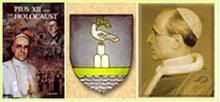
French Jewish group warns Vatican
against beatifying Pius XII

VATICAN CITY, Oct. 17 (Translated from ASCA) - The Representative Council of Jewish Institutions in France, considered the most important Jewish association in France, warned the Vatican today against eventual beatification of Pius XII.
In a communique, it said, "If this should come to pass, it would mark a serious blow to relations between the Catholic Church and the Jewish world".
Like other critics of Pius XII, the association accuses the late Pope of "never having given a clear statement to denounce the monstrosity of the extermination of millions of Jews".
Is it only me who am apoplectic with outrage at the relentless hostility of some Jewish circles such as this CRIF?
It is sheer bigotry and outright malice to completely ignore all evidence and testimony by hundreds, if not thousands,
of Jews themselves - including personalities like Golda Meir, Albert Einstein and the Grand Rabbis of Jerusalem and Rome
at the time - who, soon after the war, acknowledged gratefully what Pius XII did during the war for Jews. And this was
almost two decades before the Hochhuth/KGB-fueled campaign against Pius XII was launched, which these bigoted
Jews soon picked up.
#1 - It's none of their business who the Church beatifies.
#2 - There is a very rigid process for beatification/canonization.
It includes an opportunity for opponents and devil's advocates to present any and all allegations to show why a candidate
does not deserve beatification. They can ask to present their case at that time, but their evidence, if they have any
[beyond the absence of evidence - 'he said nothing'], must stand up to scrutiny.
#3 - "...between the Catholic Church and the Jewish world"?
Who appointed this association to speak in behalf of the entire Jewish world?
#4 - "...the extermination of millions of Jews":
Not that millions are necessarily more grievous than a single victim - since every life is God's alone to take - but not even
the best-informed statesmen had an idea in the mid-1940s of the extent and degree of the Nazi genocide!
#5 - Can these sanctimonious Jews name a single prominent Jew outside Germany, let alone any major world leader,
who spoke out in those years against Hitler?
a) Again, hardly anyone was aware of the magnitude of the catastrophe; and b) If they knew enough to want to speak out,
they probably decided that, under the circumstances, discretion (i.e., prudence) was the better part of valor, as Pius XII
decided, whatever others may think about his decision.
#6 - Don't actions speak better than words? Why refuse to see what Pius XII actually did, which was considerable and
significant, and focus only on what he did not say?
#7 - How can religious people believe themselves in the position to pass blind, unforgiving judgment on anyone?
Does being human excuse arrogating to oneself what is God's alone to do?
I wonder what Rabbi Neusner has to say about all this.
P.S. I posted this here, because the anti-Pius Jewish game plan appears to be to play Benedict XVI off against John Paul II -
by placing the 'burden' on him of 'displeasing' them to the point of 'ruining' what John Paul II had established.
They were probably encouraged that Benedict XVI has delayed signing the decree on Pius XII's heroic virtues, and think
they can cow him even further.
Well, Benedict XVI did not rush to issue the Motu Proprio on the traditional Mass in deference to its opponents, but
he moved when he thought the time was right. I don't think it's going to be any different in this case.
[Modificato da TERESA BENEDETTA 18/10/2008 00:00] |
 18/10/2008 13:38 18/10/2008 13:38 |
|
| | | OFFLINE | | Post: 15.380 | Registrato il: 28/08/2005
| Utente Gold | |
|
 Like L'Osservatore Romano, Avvenire gave prominent play to the Holy Father's message on Thursday, on the occasion of the annual World Food Day observed by the Rome-based Food and Agricultural Organization (FAO) of the United Nations.
Like L'Osservatore Romano, Avvenire gave prominent play to the Holy Father's message on Thursday, on the occasion of the annual World Food Day observed by the Rome-based Food and Agricultural Organization (FAO) of the United Nations.
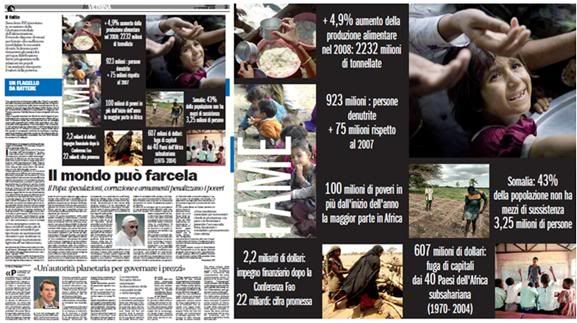 Its reportage of the message, which it entitled 'The world can do it'
Its reportage of the message, which it entitled 'The world can do it'
(meet the food crisis) included some sobering statistics on world hunger.
['fame' is the Italian word for hunger.] Below, is the FAO's current 'hunger map'
which shows the extent of under-nourishment in the countries of the world.
The extent of hunger in each country is indicated by the progression from yellow
to red and brown.
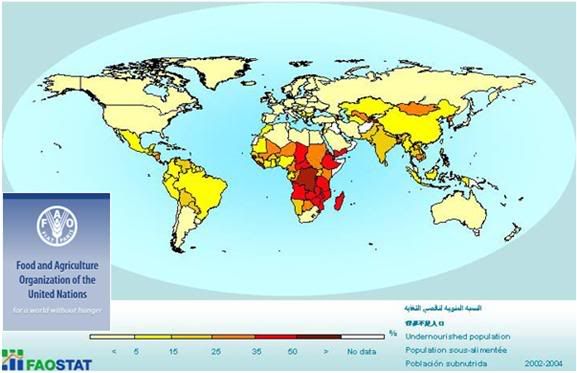 Avvenire had this interview with an economist, who has some ideas in the light of the Pope's message.
A planetary authority
Avvenire had this interview with an economist, who has some ideas in the light of the Pope's message.
A planetary authority
to regulate food prices
by PAOLO FERRARIO
Translated from

"To guarantee world food security, there is little to invent: farms must be properly cultivated, while markets must be truly free and oriented to the correct distribution of products. Unfortunately, however, these items don't count among the priorities of politicians, and the international community has never really decided to face the problem."
The criticism of international institutions that 'should guarantee food for everyone' comes from Prof. Riccardo Moro, economist, an expert in the battle against poverty and director of the Fondazione Giustizia e Solidarieta of the Italian bishops conference.
In the wake of the Pope's message for World Food Day, Moro has proposed the creation of an international authority which will watch over the correct functioning of the market in food products, govern the concerted action among nations on food production quotas and prices, and oversee correct distribution of food products.
You mean a sort of common agricultural policy that is worldwide, not simply European...
That would be the basic premise. Along the lines of what we have done in Europe, carrying to a global level our system of assessing the food requirements of individual nations and establishing production quotas on that basis.
What institution could assume that role?
Despite all its limitations, which unfortunately, it is demonstrating during this current crisis, it could be the already existing World Trade Organization.
What should be the main provisions to adopt in order to rein in the 'frenzied speculation' in food commodities that Benedict XVI has denounced?
The first should be a ban on issuing financial paper and derivatives linked to the movement of food prices.
Only a few countries prohibit these now (an example is Belgium) but speculation in food commodities is at the basis of the food crisis in so many countries of the world's 'South', where governments are no longer able to import food staples because world prices have become unaffordable.
In many cases, the people who suffer don't even own the land they cultivate [or don't have any land to cultivate]. How can food security come about in these conditions?
That is a central issue, because the challenge can be met only if one considers the local communities and the families that make them up, without creating obstacles to owning farmland, which very few have [in the most afflicted countries].
The Pope also expressed the wish for a 'new international cooperative': what role can Italy play, especially in making sure that development aid and international assistance really get to the people it is supposed to help?
Italy has a very good tradition in this area, promoted by non-governmental organizations and associations, which, following the principle of subsidiarity [according to which, any central authority only has a subsidiary function, performing only those tasks which cannot be performed effectively at a more immediate or local level], are 'twinned' to individual countries of the developing world in order to incentivize agricultural development.
Unfortunately, in international organizations, our credibility has been undermined by the political choice, for example, to cut down our government's contribution to such cooperation by at least 30-40 percent.
Another very pressing emergency that the Pope has often denounced is that in education....
Which has a fundamental role in promoting development. The school is the first environment for education in the values that are the basis for building up the great family of man. But again, unfortunately, there does not appear to be great sensitivity about this issue at the institutional levels.
[Modificato da TERESA BENEDETTA 18/10/2008 15:14] |
 18/10/2008 14:06 18/10/2008 14:06 |
|
| | | OFFLINE | | Post: 15.381 | Registrato il: 28/08/2005
| Utente Gold | |
|

OR today.
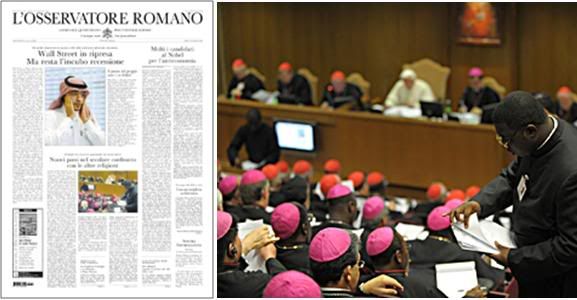
Once again, the main story is on the current financial crisis ('Wall Street rebounds but the nightmare
of recession looms'), and an editorial commentary on the 'many candidates for the 'Nobel in anti-economics'.
The main Church story is on the Synod (what's happening in the working groups, with proposed new steps
in the secular encounter with other religions. Other stories: the Pope's remarks on John Paul II
at the premiere of the film Testimony; and a story on Cardinal Bertone's 'faith and reason' address
at the Lateran (reported by Avvenire the previous day).
THE POPE'S DAY
It is the 12th working day of the Synod assembly.
At 5 p.m., the Holy Father celebrated the First Vespers of the XXIX Sunday in ordinary time
at the Sistine Chapel*, with Ecumenical Patriarch Bartholomew I and the Synod Fathers on
the occasion of the Patriarch's participation in the work of the XII General Assembly of
the Bishops' Synod.
[*Would this be the first time that an Orthodox prelate celebrates a liturgy in the Sistien Chapel?]
The Press Office finally released the text of the Pope's extemporaneous intervention at
the Synod Assembly on Monday. Full translation in the post below.
It also announced a news conference on Wednesday, Oct. 22, to present the first volume of
the Opera Omnia [complete works] of Joseph Ratzinger-Benedict XVI
in the German edition published by Herder.
Presenting the book will be Mons. Gerhard Ludwig Müller, Bishop of Regensburg; Mons. Giuseppe
Antonio Scotti, president of LEV, the Vatican publishing house; and Don Giuseppe Costa, S.D.B.,
director of LEV (which holds the world copyright on all the writings of Joseph Ratzinger-Benedict XVI).
[Modificato da TERESA BENEDETTA 18/10/2008 17:07] |
 18/10/2008 15:09 18/10/2008 15:09 |
|
| | | OFFLINE | | Post: 15.382 | Registrato il: 28/08/2005
| Utente Gold | |
|
 Here is a translation of the papal text released today by the Vatican Press Office.
Here is a translation of the papal text released today by the Vatican Press Office.
INTERVENTION OF THE HOLY FATHER BENEDICT XVI
at the 14th General Congregation
of the XII Ordinary General Assembly
of the Bishops' Synod, October 14, 2008
Dear brothers and sisters,
The work for my book on Jesus amply offers an occasion to see all the good that comes from modern exegesis, but also to recognize its problems and risks.
Dei Verbum in Paragraph 12 offers two methodological indications for adequate exegetic work.
In the first place, it confirms the need for the use of the historico-critical method, whose essential elements it briefly describes. This necessity is the consequence of the Christian principle formulated in John 1,14, Verbum caro factum est (The Word was made flesh).
The historical fact is a constitutive dimension of Christian faith. The story of salvation is not a myth, but a true story and must therefore be studied with the methods of serious historical research.
Nonetheless, this story has another dimension, that of divine action. Consequently, Dei Verbum speaks of a second methodological level necessary for a correct interpretation of words which are human and divine at the same time.
The Council says, following a fundamental rule of interpreting any literary text, that Scripture is to be interpreted in the same spirit in which it was written, and indicates three fundamental methodological elements in order to take into account the divine dimension, the pneumatologic [of the Holy Spirit], of the Bible. Therefore, one must interpret (Bible) text keeping in mind the unity of all Scripture.
Today, this is called canonical exegesis. At the time of the Council, this term had not been created, but the Council says the same thing: 1) One must take into account the unity of all Scripture.
2) One must also consider the living tradition of the whole Church; and finally,
3) One must observe the analogy of faith.
Only where the two methodological levels - the historico-critical and the theological - are observed, can one speak of a theological exegesis, an exegesis that is appropriate for this Book.
Whereas at the first level, present academic exegesis is of a very high level which really helps us, the same cannot be said of the other level.
Often, this level - the one constituted by the three theological elements indicated by Dei Verbum - is almost absent. And these has rather serious consequences.
The first consequence of the absence of this second methodological level is that the Bible becomes only a book about the past. That can have moral consequences: One can learn history, but as such, the Book speaks only about the past, and exegesis is no longer really theological - it becomes pure historiography, a story of literature.
And that is the first consequence: the Bible remains in the past, speaks only about the past.
There is a second consequence which is more serious - in which the hermeneutic of faith, indicated by Dei Verbum, disappears; and there necessarily emerges another hermeneutic, one that is secularized, positivistic, whose fundamental key is the conviction that the Divine does not appear in human history.
According to such a hermeneutic, whenever there seems to be a divine element, it must be explained where such impression comes from, thus reducing everything to the human element. Consequently, interpretations are proposed that deny the historicity of divine elements.
Today, the so-called mainstream of exegesis in Germany, for example, denies that the Lord instituted the Eucharist and says that the body of Jesus remained in the tomb. That the Resurrection was not a historical event but a theological vision.
This happens in the absence of a hermeneutic of faith: a profane philosophical hermeneutic is affirmed which rejects the possibility of the entry and real presence of the Divine in history.
The consequence of the absence [in the Church] of the second methodological level is that a profound gap has been created between scientific exegesis and lectio divina. It is this precisely which gives rise at times to a kind of perplexity even in the preparation of homilies.
Where exegesis is not theology, Scripture cannot be the soul of theology, and vice-versa. When theology is not essentially the interpretation of Scriptures in the Church, this theology no longer has any foundation.
That is why, for the life and mission of the Church, for the future of the faith, it is absolutely necessary to overcome this dualism between exegesis and theology.
Biblical theology and systematic theology are two dimensions of a single reality that we call theology. That is why I think it would be proper if one of the (Synod) propositions speaks of the need to have both methodological levels indicated by Dei Verbum present in exegesis, which will speak of the need to develop an exegesis that is not merely historical but also theological.
Therefore, it will be necessary to broaden the formation of future exegetes in this sense, in order to really open up the treasures of Scripture to the world today and to all of us.
[Modificato da TERESA BENEDETTA 18/10/2008 23:33] |
 18/10/2008 17:00 18/10/2008 17:00 |
|
| | | OFFLINE | | Post: 15.383 | Registrato il: 28/08/2005
| Utente Gold | |
|
 Pompeii will be Benedict XVI's
Pompeii will be Benedict XVI's
12th pastoral visit in Italy
Translated from
the Italian service of

Tomorrow, Benedict XVI will be at the Shrine of the Virgin of the Holy Rosary in Pompeii on his 12th pastoral visit in Italy (outside Rome). Sergio Centofanti reports from Pompeii:
Benedict XVI is the second Pope to make a pilgrimage to Pompeii. Before him, John Paul II visited here in 1979 and in 2003, his second-to-last pastoral trip in Italy (his last was to another Marian shrine, Loreto, in 2004).
On his visit, Papa Wojtyla drew from the lesson of ancient Pompeii, which in 79 A.D. was transformed by a devastating eruption of Mt. Vesuvius from a flourishing and rich city of the Roman Empire into a desert of ash.
He called it "a human tragedy that raised the the decisive question on what is man's destiny' - a question that "can only find an answer in Christ, his death and resurrection".
In fact, that desert bloomed again, after 1800 years, thanks to faith, the faith of one man, Bartolo Longo, an advocate from the Puglia region who was caught up in the anti-clerical and positivist spirit of the latter half of the 19th century.
On a visit through the desolate area of Pompeii in 1870, he heard a voice that said "Spread the Rosary and you will be saved".
That voice changed his life and transformed a desolate valley inhabit by poor peasants into a living community of prayer and charity, where orphans, young people in need, the children of jailed parents, women in difficulty, the 'least' among people, became first in attention and care.
The whole story of modern Pompeii sounds like an impossible episode that became reality, thanks to total abandon to Mary, thanks to the simple and profound prayer of the Rosary.
The Rosary is a prayer that is ever more relevant, as Benedict XVI pointed out on May 3 at the Basilica of Santa Maria Maggiore:
The Holy Rosary is not a pious practice relegated to the past, nor a prayer from other times which we only think about with nostalgia. The Rosary is, in fact, undergoing a new spring almost. This is undoubtedly one of the most eloquent signs of the love that the new generations feel for Jesus and for Mary his mother.
In the present world that is so dispersive, this prayer helps to put Christ in the center, as the Virgin did, who meditated in her heart on all that was said about her Son, and on all that he said and did.
- Remarks after leading the Rosary to mark the Month of Mary
Praying the Rosary, John Paul II said, brings peace to hearts, peace to families, peace to the world. Through its mysteries, Benedict XVI added in his remarks at Santa Maria Maggiore, "we orient our life towards Jesus" in the moments of joy and light and glory, but even of sorrow:
May Mary help us to receive the grace that comes from these mysteries, so that through us, this grace may 'irrigate' society, starting with our daily relationships, and purify it of so many negative forces, opening it up to the news of God.
The Rosary, when it is prayed authentically, not mechanically or superficially, but profoundly, brings peace and reconciliation. It contains the healing power of the most holy name of Jesus, invoked with faith and love at the center of every Hail Mary.
Bartolo Longo said to his people in 1901: "You will see. One day, the Pope will come to Pompeii." And for the third, time the Successor of Peter will be here.
The founder of the New Pompeii, like all saints, carried on his mission amidst tribulations and calumnies, always trusting in Providence and obedient to the Church.
To those consternated persons who called on him to react appropriately in the face of financial ruin, he said calmly, with his rosary in hand: "Reawaken your confidence in the Most Holy Virgin of the Rosary. You should have the faith of Job. Adored Holy Mother, I place in your hands my afflictions, every hope and every confidence."
It was 1998 when then Cardinal Joseph Ratzinger, prefect for the Congregation of the Doctrine for the Faith, came as a pilgrim to Pompeii with his brother Georg and many members of the CDF.
He was particularly struck by the popular piety that he witnessed among the pilgrims. But what is the relationship between popular piety and faith? Isabella Piro asked this of Mons. Carlo Liberati, Archbishop-Prelate of Pompeii and Pontifical Delegate for the Shrine:
MONS. LIBERATI: We know that the Word was made flesh - Faith in God cannot exist unless it is incarnated in the reality of life. Jesus tells us that we should put his words into practice, that faith does not exist if it is not manifested through our actions in our personal life and in the communitarian and social life of the Church.
Thus, the relationship between 'popular piety' and faith is a necessary one. I should not only let my faith show, make it visible, but also transmit through works of faith.
And how can I make my faith visible to the people of God? With an extraordinary and indispensable activity - the celebration of the Eucharist through which, with Christ, we come before the Father and together make an offering to him.
The Eucharist is the sacrifice of Christ, who was crucified and resurrected, with us, the Church. this miracle is realized in popular piety, which also consists of so many prayers that are born from the Eucharist.
Among the most beautiful of prayers is the Holy Rosary, the 'sweet chain' that unites us to God, as Bartolo Longo said, the link of love that makes us brothers and unites is with the angels in Paradise, we who are sinners and pilgrims on earth but who aspire to become saints.
Blessed Bartolo created so many social works of charity. How is the Prelature of Pompeii carrying this on?
Among other things, we have a polyfunctional Center for education, which at the moment is taking care of 150 children rescued from the streets, They are children of parents who are jailed, separated or divorced, single mothers, and the most destitute families. We provide food, clothes, schooling, after-hours activities, as well as spiritual and religious instruction.
We have a separate residence for older children around 18 years; Casa Emmanuel for pregnant women and women who have seriously ailing children; a "Center of aid for life' which supports women in need who have decided not to abort.
We also created an assistance center called 'Miriam' to lend an ear, inform, orient and provide assistance to persons with various social emergencies, with particular attention to women immigrants.
Then we have a 'family house; called 'The garden of smiles' to accommodate infants and children up to 10 years of age, and we are about to complete setting up the 'House of the Mother of Jesus' in the former home for laborers set up by Blessed Bartolo.
In the field of evangelization, and precisely in the footsteps of Blessed Bartolo, what is the role for the lay faithful?
We too are feeling the general crisis among lay faithful. We ought to be more engaged. We are trying to do this by strengthening catechesis in the parishes, associations and spiritual movements, because we cannot transmit the faith unless we first have it in us.
What expectations do you have from the Pope's visit to Pompeii?
That of inspiring a decisive renewal of Christian life. We have become a people that needs to be re-evangelized. Let me make an example. Every day, people come to us to have their cars blessed with holy water.
I worked up the courage to confront some of them to say: "Look out! This can be mere superstition. Firs to fall, you must renew your heart, your conscience, your behavior, to be in accordance with Christian life. If you violate the Commandments, then what is the use of our blessing?" That usually brings them up.
So I tell them, "Do not act and behave out of superstition or habit. What you must do is try to change your life. Your car does not commit sins; it is we, humans, who commit sin."
And so, in this sense, we hope that the Holy Father's visit will spur such a renewal of Christian life, as well as a greater intensity among pilgrims so that in their encounter with the Virgin of the Rosary, they may remember to offer their sacrifices to the Lord who is always calling on them in the depths of their heart. I hope that the Holy Father's visit will help us to renew this spirituality.
|
 18/10/2008 18:27 18/10/2008 18:27 |
|
| | | OFFLINE | | Post: 15.384 | Registrato il: 28/08/2005
| Utente Gold | |
|
 Theme panel added after Caterina's videocap montage.
NOTES WHILE WATCHING VESPERS
Theme panel added after Caterina's videocap montage.
NOTES WHILE WATCHING VESPERS
AT THE SISTINE CHAPEL
P.S. AND THE SURPRISE THAT FOLLOWED...
Another inspired idea by the Holy Father to celebrate Vespers today with Patriarch Bartholomew I and the Synod participants in the Sistine Chapel. It must be a special treat to most of the Synod bishops who have not had an occasion to attend a liturgy in the Sistine Chapel. And for the TV viewer!
Even on TV, one can only be awestruck in adoration, contemplating Michelangelo's Christ of the Last Judgment, my favorite image of Christ because in all its youthful dynamism, it is unlike any other and goes against all stereotypes. [And of course, by the magnificent clean-up and restoration of the historic frescoes completed in 1994 - they all look fresh and brilliant].
All those masterful Biblical images, in the context of the Synod and the age-old chanting of Vespers in Latin, have multiple resonances, as does the service itself, which gives us a wondrous sense of the way monks have celebrated the hours of the Divine Office for centuries - with the added bonus that the service was presided by the Pope and the Patriarch of the Orthodox world in this incomparable setting.
Both the Pope and the Patriarch chanted their blessings at the end of the service. This was followed by a chanting of the Ave Maria (something I don't remember having heard before)....
And then, most surprisingly, the service segued into the Patriarch's actual Synod intervention, which the Holy Father introduced briefly.
The Patriarch spoke in English, thankfully, in a clear and deliberate way, so one had a first - and firsthand - experience ever of a synod intervention, by someone who is arguably the most canonically important participant after the Pope himself. [Has a Synod session ever been televised before?]
It was a concise, pithy and beautiful presentation from the Orthodox point of view (of experiencing Scriptures with the physical and spiritual senses), rich with quotations from the great Greek Fathers. {In the back of my mind, I was thinking - Imagine what it would be if Alexei of Moscow unbent from his ecclesio-political rigidity to be in communion with Rome as Bartholomew is!]
At the end of the presentation, he addressed the Holy Father as 'dear elder brother in Christ'....
I pounded away at the computer tyring to take down what the Patriarch said - I have most of it, and I will try to summarize it ASAP if the news agencies do not come out with a story earlier....
The Holy Father's words of appreciation at the end, delivered informally in what must be his usual way of speaking Italian (not as he delivers it) - as fast and as fluid as when he speaks in German....
He said: "The applause you heard was more than just courteous appreciation - it was an expression of spiritual joy at the live experience of communion: We have really experienced 'synodos' - walking together in the Word of God, and the beauty of being listeners together to the Word of God.... We will reflect on your words in the days to come, even after the Synod, and use them in its work..."
He also remarked that while the Patriarch had 'strongly contextualized the Word of God in our time", he had also quoted liberally from Patristic thought - the wisdom of 'your Fathers who are also our Fathers, just as our Fathers are yours, our Fathers in common".
What an experience it has been! Thank you, dearest Holy Father, for making it possible. When I turned on the TV today, I was not at all expecting to 'witness' an event that is so historic in many ways!.....
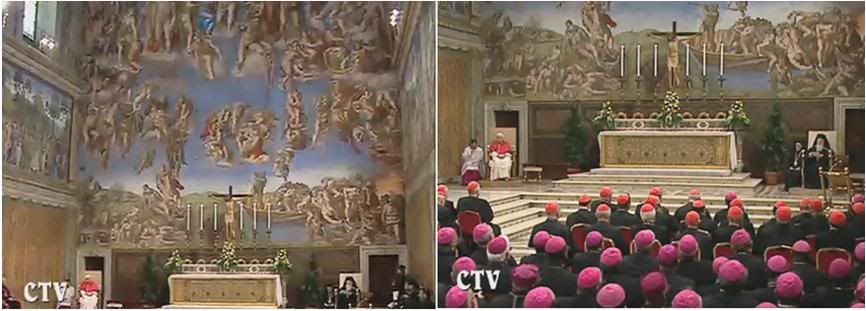 (Photos taken from Caterina's montage in next post)
But look at the first news agency bulletin out about the Patriarch's intervention!
Bartholomew I:
(Photos taken from Caterina's montage in next post)
But look at the first news agency bulletin out about the Patriarch's intervention!
Bartholomew I:
'Let us together fight
against poverty and racism'

VATICAN CITY, Oct. 18 (Translated from Apcom) - The Ecumenical Patriarch Bartholomew I has called on the Catholic church - starting with the Pope - to a common commitment to fight poverty, racism and fundamentalism.
"As disciples of God," he said, on the occasion of Vespers celebrated in the Sistine Chapel, "it is today more imperative than ever to provide a single perspective - beyond the social, political and economic - on the need to eradicate poverty, promote equilibrium in the global context, combat fundamentalism and racism, and devleop religious tolerance in a conflictual world."
The Ecumenical Patriarch called the Pope's invitation for him to take part in the Vespers, and his presence at the Synod, as a 'historic event', and he expressed the hope that the Catholic and Orthodox Churches would 'converge fully on the role of the primacy (of the Pope) and synodality in the life of the Church".
Bulletins like this miss the entire spiritual context of the event and even of the Patriarch's intervention itself, in which common action to help correct the wrongs of society was cited only as one of the ways in which Christianity can make the Word of God visible and tangible.
In fact, quoting St. John Chrysostom, he said memorably, "The sacrament of our neighbor canot be separated from the sacrament of the altar", which is a beautiful formulation of charity, and of justification by both grace and good works.
[Modificato da TERESA BENEDETTA 21/10/2008 11:41] |
 18/10/2008 19:37 18/10/2008 19:37 |
|
| | | OFFLINE | | Post: 15.385 | Registrato il: 28/08/2005
| Utente Gold | |
|

Once again, many thanks to Caterina in the main forum, who has posted a video-cap montage of the Sistine Chapel event, before the news agencies have been able to file a single photo online! Her pictures pick up from where the Patriarch Bartholomew addresses the Synod.
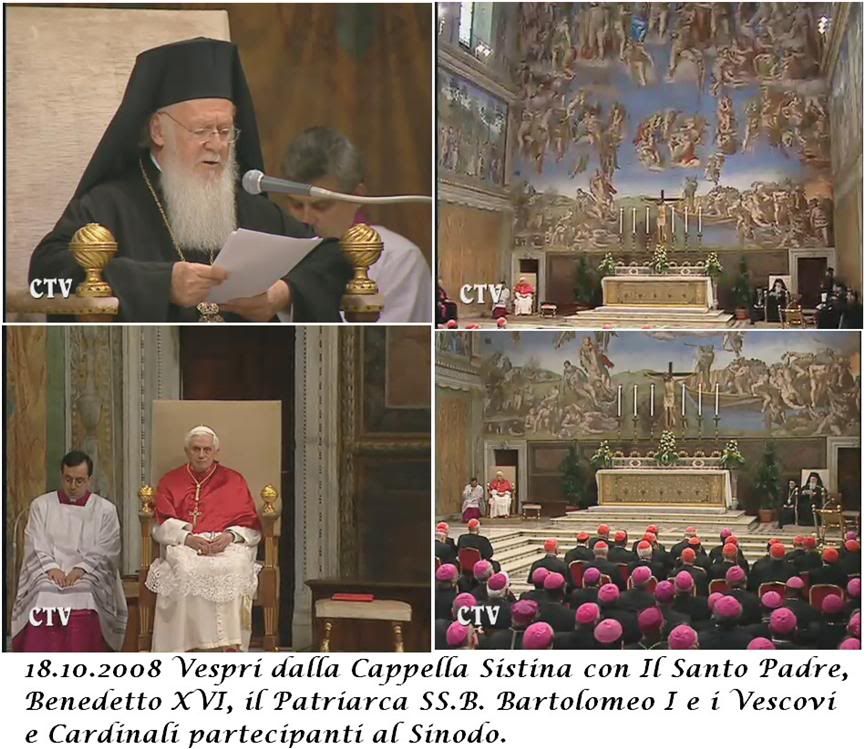
The following were taken during the Pope's closing remarks of appreciation:
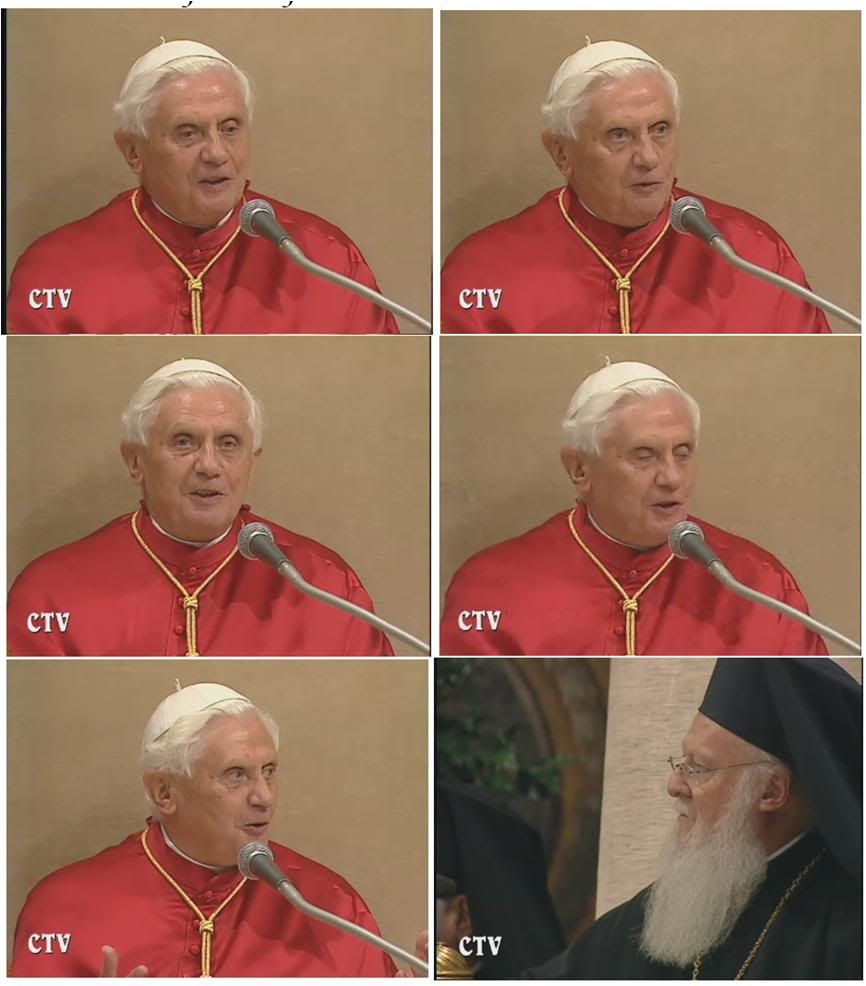
|
 18/10/2008 22:22 18/10/2008 22:22 |
|
| | | OFFLINE | | Post: 15.386 | Registrato il: 28/08/2005
| Utente Gold | |
|
 Benedict's gesture of good will -
Benedict's gesture of good will -
and why he can't visit Israel
until there is a reciprocal move
Translated from

ROME - A gesture of goodwill to obtain from Jewish opponents a profound rethinking about their historical judgment of Pope Pius XII.
This is the right interpretation of Benedict XVI's decision to momentarily delay the next step in the beatification process for the late Pope, according to Fr. Peter Gumpel, the Jesuit who is the postulator for Pius XII's beatification cause.
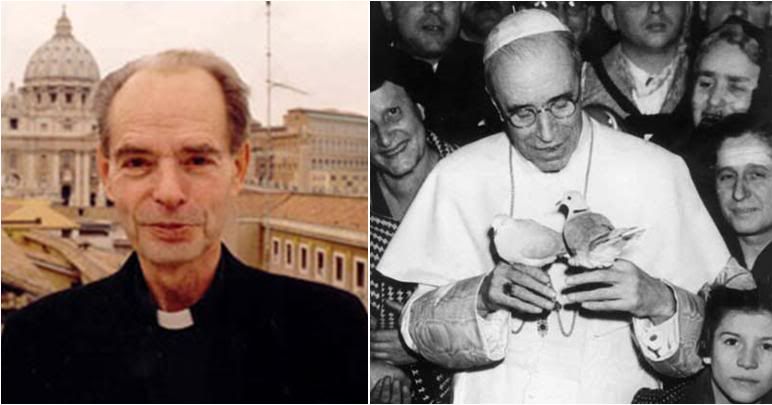
He said Pope Benedict was showing that the Church does not intend to 'force' the beatification process, but offered the gesture in the hope of a revaluation of Pius XII on the part of Israeli historiography - a revaluation which should, above all, begin with the removal of a controversial caption to a photo of Pius XII at the Yad Vashem Holocaust memorial museum in Jerusalem.
Fr. Gumpel also said that the Pope, much as he wants to visit Israel, would not be able to do unless this specific problem is resolved.
"A papal visit to Israel would be impossible as long as the caption, which is an evident historical falsification, is not removed," Fr. Gumpel said.
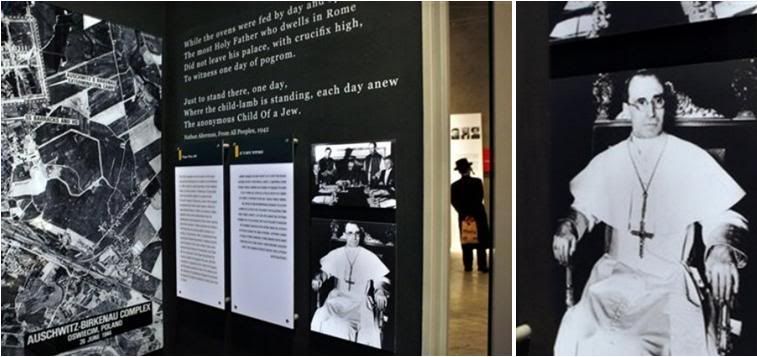 The photo in Yad Vashem is found in the so-called 'Hall of Shame' along with other heads of state who 'did nothing for the Jews'.
The photo in Yad Vashem is found in the so-called 'Hall of Shame' along with other heads of state who 'did nothing for the Jews'.
The caption reads:
In 1933, when he was Secretary of the Vatican State, he was active in obtaining a Concordat with the German regime to preserve the Church's rights in Germany, even if this meant recognizing the Nazi racist regime.
When he was elected Pope in 1939, he shelved a letter against racism and anti-Semitism that his predecessor had prepared. Even when reports about the murder of Jews reached the Vatican, the Pope did not protest either verbally or in writing.
In December 1942, he abstained from signing the Allied declaration condemning the extermination of the Jews. When Jews were deported from Rome to Auschwitz, the Pope did not intervene. The Pope maintained his neutral position throughout the war, with the exception of appeals to the rulers of Hungary and Slovakia towards its end.
His silence and the absence of guidelines obliged Churchmen throughout Europe to decide on their own how to react.
[As I have just now seen a fuller picture of the Yad Vashem display, I realize there is a poem written in magnified letters above the caption that is even more offensive and that is not justified even by so-called 'poetic license'.
While the ovens were fed by day and night
The most Holy Father who dwells in Rome
Did not leave his palace, with crucifix high,
To witness one day of pogrom.
Like the caption, it manipulates facts to fit a deep-seated prejudice. For instance. who knew about 'ovens' before the end of the war? The whole prejudice-resentment-hatred-scapegoat complex directed by hostile Jews against Pius XII is just unacceptably irrational - it's as if they are laying the full blame of the Holocaust on him - and the Catholic Church, indirectly! This is just as morally objectionable as anti-Semitism.]
"As long as that caption - which even the Jewish scholar Sir Martin Gilbert, one of the most eminent historians of the Shoah, has asked to be removed - Benedict XVI cannot visit Israel, because it would be a scandal to Catholics", Gumpel stressed.
He observed that "the Catholic Church has been doing all it can to have good relations with Israel, but friendly relations can only be built with reciprocity".
The Pope, he says, made the first step in this direction by, in effect, placing Pius XII's beatification on 'standby'.
"That process," he said, "which requires the Pope's signature on the decree about Pius XII's heroic virtues [unanimously approved by the Cardinals and bishops who make up the Congregation for the Causes of Sainthood], is on hold because of the Pope's cocnern for good relations with the Jews."
 reports more of Gumpel's statements
reports more of Gumpel's statements:

"With great hospitality, the Pope invited a rabbi to address the Bishops Synod, and what he did was to attack Pius XII on three ocasions. He is free to say what he wants, but when someone who is a guest behaves in this way, then it does not help to improve relations," Gumpel added.
The documents that purport to show Pius XII's ambiguous attitude towards the Jews in World War II are 'manipulated and exaggerated' as part of a 'denigratory campaign', according to Fr. Gumpel.
He says documents available from English and American war archives refute two concrete accusations made against Pius XI.
The first concerns the meeting between the Pope and the ambassador of Great Britain two days reportedly after a round-up of Jews from the ghetto of Rome by the Nazis, about which Pius XII 'made no public comment'.
"That meeting," said Gumpel, "took place two days before the round-up, on October 14, not October 18, so the Pope could not possibly have commented about something that had not yet happened".
The second concerns a conversation that Pius XII had on December 13, 1943 with the Geman ambassador Ernst von Weiszaecker, which the ambsssador reported to Hitler.
Gumpel said, "It is a historical fact that the German ambassadors at the time - Von Wieszsaecker, in particular - usually wrote what they thought would please Hitler, otherwise they risked being fired".
He points out that the Jews themselves are 'very divided' on the question of Pius XII between two extremes - "There are those who continue to attack the Catholic Church saying that Jesus was the son of a Roman soldier and a Jewish prostitute (while) there are others who say that no one saved as many Jews during the war as Papa Pacelli".
What exactly are the heroic virtues that the Catholic Church would recognize in Pisu XII and which would justify a cause for beatification?
Fr. Gumpel responds that "the concept of heroic virtues is an internal matter for the Church" about which "we do not need the opinion of Protestants, Calvinists, other confessions or religions."
"Papa Pacelli's heroic virtues," he says, "are a theological quesiton that is only for the Chruch to decide."
Finally, returning to the question of Catholic relations with the Jews, Fr, Gumpel says, "Many Jewish critics say that they should be able to study all the documents in the Vatican Archives, questioning the fact that so far, only documents up to 1939 are available to researchers."
"But why," he asks, "don't they look at the accessible documents, from the years before 1939, when Pacelli was Secretary of state?"
There was a prompt reaction from the Vatican to Fr. Gumpel's statements:
Vatican spokesman says
'objections' to Pius XII caption
in Holocaust museum are not blocking
a papal visit to Israel
By FRANCES D'EMILIO

VATICAN CITY, Oct. 18 (AP) _ The Vatican denied assertions Saturday that a caption displayed at Israel's Vad Yashem Holocaust museum alleging Pius XII didn't do enough to save Jews during World War II would keep Pope Benedict XVI from visiting Israel.
But Vatican spokesman Rev. Federico Lombardi urged museum officials to make "a new, objective and in-depth review" of the caption, which says Pius did not protest the Nazi genocide of Jews during the war and maintained a largely "neutral" position.
Lombardi weighed in after a Catholic official promoting the cause which could lead to sainthood for Pius gave interviews Saturday in which he said the caption was the main reason the Pope cannot go to Israel.
The Rev. Peter Gumpel called the caption flap "the most burning" reason why a pilgrimage by Benedict to Israel hasn't taken shape.
"How can he go there knowing these captions are absolutely historically untrue?" Gumpel asked rhetorically in a telephone interview with The Associated Press.
"Catholics would be mortally offended," said Gumpel, a German Jesuit who has been spearheading efforts for Pius's beatification, the last formal step before possible sainthood.
Benedict paid tribute to Pius earlier this month at a Mass to mark the 50th anniversary of Pius's death, reiterating the contention that Pius, who became Pontiff in 1939, shortly before the war started, quietly worked behind the scenes to save as many Jews as possible.
Israeli foreign ministry spokesman Yossi Levy told The Associated Press in Jerusalem that Benedict "will be a welcome guest under any circumstances."
But as long as Vatican archives on Pius's papacy remain closed to researchers "the debate over Pope Pius XII's actions or inaction in that horrendous period remains an open and painful one," Levy said.
Earlier this decade, the Vatican opened its secret archives to researchers to include the period just before Pius was elected Pontiff. It says the archives spanning the 1939-1958 papacy of Pius will be opened later.
Benedict has a long-standing invitation from Israel for a visit. The Holy See and Israel established diplomatic relations in the early 1990s, but last year, the Vatican ruled out a trip saying the two sides must settle long-standing differences over expropriated church property, tax exemptions for the Church and permits for Arab Christian clergy traveling to and around the West Bank.
Lombardi, however, denied the caption was an obstacle to a possible future trip by Benedict.
"Nevertheless, this fact cannot be considered a determining factor for a decision on any visit by the Holy Father to the Holy Land, a trip, which, as it is known, is among the Pope's desires, but for now hasn't seen concrete planning," said Lombardi said in a statement.
The statement also said Benedict is reflecting on a vast dossier of documentation on Pius before declaring that his predecessor exhibited heroic virtues, a necessary finding for the beatification process to go forward.
[Modificato da TERESA BENEDETTA 19/10/2008 10:59] |
|
|
|
|